- Home
- Ann M. Martin
Welcome to Camden Falls Page 4
Welcome to Camden Falls Read online
Page 4
You would never guess, from a quick peek in Min’s window, that she and Ruby and Flora have been a family for just five months.
On Monday morning, Sonny Sutphin, making his way slowly through town in his wheelchair, noticed Min Read walking smartly along Main Street, hand in hand with her granddaughters.
“’Morning, Min,” called Sonny.
“’Morning, Sonny,” replied Min. “Sonny, I don’t believe you’ve met my grandchildren yet. This is Flora Northrop and this is Ruby Northrop.” Flora and Ruby stepped forward and shook Sonny’s hand.
“Pleased to meet you,” said Sonny. He turned to Min. “Back at work?”
“My first day. I’ve been away for a long time. Ruby and Flora are coming to the store with me.”
“We’re going to spend every day there,” said Ruby, glaring at Min and stabbing the toe of her sneaker into a crack in the sidewalk.
“Ruby,” said Min, a warning in her voice.
“Well, what am I going to do all day?”
“At Needle and Thread? Goodness me, I think you’ll keep yourself occupied,” replied Min. “And please don’t whine. It isn’t becoming.”
Ruby almost said “Becoming what?” but stopped herself in time.
Sonny waved good-bye, and Min and Ruby and Flora continued down the street. Ruby was scowling fiercely, but Flora wore a small smile on her face. Flora hadn’t admitted this to her sister — it wasn’t any fun telling something good to someone crabby — but she was looking forward to spending her days at Needle and Thread. In fact, just thinking about this was one of the few things that made her feel truly happy. Needlework was Flora’s passion. She liked sewing. She liked quilting. She liked embroidering. She liked embellishing things. She liked fabric and buttons and beads and patterns and ribbons and lace. (She also liked knitting and crafting and card making, but Needle and Thread didn’t carry many supplies for those hobbies.)
When Flora was very small, her busy grandmother had taken the time during visits to teach her to sew. (Later, Min had offered to teach Ruby, but Ruby was more interested in ballet classes and tap routines and voice lessons.) Flora had first made pillows and blankets for her dolls but was soon learning crewel work and even smocking. Her mother had taught her to knit. And now the thought of spending summer days at Needle and Thread made her let go of Min’s hand and skip the last few paces to the store.
“Mrs. Walter’s already here!” she said, peering through the door.
From behind her, Ruby said, “Do we really have to spend every single day here, Min?”
Min stopped walking. She looked down at her granddaughter. “Ruby,” she said, trying to sound patient, “this is my store. Mrs. Walter and I own it. We have to run it. Do you understand that?” (Ruby nodded.) “I have worked out the best hours I can, but I still have to be here at least five days a week. In the fall you will go to school, and if you want to go to after-school activities you may. But this is the summertime. What do you suggest you do all day while I’m at the store? I can’t leave you at home alone, and I haven’t arranged for a baby-sitter —”
“I don’t want a baby-sitter. I’m not a baby.”
“Okay. And I’m sorry, but I didn’t get around to looking into day camp or anything else. This has been a busy time. I know it isn’t what you want, but bear with me. We all have to make sacrifices. I promise you, though, things will work out. For now, you and Flora will come to the store with me. I don’t think you’re going to be bored. There will be plenty for you to do. Please just give it a try. I’m doing the best I can.”
“Okay,” muttered Ruby. “I’ll try.”
“Thank you,” said Min.
Flora flung open the door to Needle and Thread. She was greeted by the smell of coffee, and while the coffeemaker steamed and gurgled, Olivia’s grandmother was setting out cups and spoons and packets of sugar on a table at the front of the store.
“Hi, Mrs. Walter!” said Flora.
“Flora,” Mrs. Walter replied warmly. She wrapped Flora in a giant, bosomy hug. “How are you?”
“Fine, thank you,” said Flora.
Ruby and Min stepped inside then, and Mrs. Walter opened her arms to Ruby. “I’m glad you’re here,” she said.
Min grinned at Mrs. Walter. “Ruby wants to be put to work,” she said. “She’s afraid she’s going to be bored.”
“Bored? Never,” said Mrs. Walter.
Flora turned her attention away from crabby Ruby and looked around the store. She let out a long, satisfied sigh. There in the front of Needle and Thread were the couches for people who stopped by for a chat-and-stitch. All day long, Min and Mrs. Walter’s customers dropped in with their sewing projects and sat on the couches, drinking coffee or tea, sewing and chatting with whomever else was there. The coffeepot was kept going all day long, and often people brought in cookies or muffins to share.
“See? Isn’t this nice?” Flora said to Ruby. “People will be coming in for chat-and-stitches.”
“And sometimes,” said Mrs. Walter, “we have a special event here in the evening — a lecture, or an author reading from a new book.”
“Lectures and books about sewing?” asked Ruby.
“Not necessarily,” replied Mrs. Walter. “Needle and Thread is a gathering place. All sorts of things go on here.”
Flora drifted toward the back of the store, past the checkout counter and several racks lined with bolts of fabric, to the tables where classes were held. There were classes for adults and for kids. All kinds of classes. Quilting, ribbon embroidery, holiday projects.
“Min?” Flora called to the front of the store. “Could I please take a kids’ class sometime?”
“I think you could help teach the kids’ classes,” replied Min, and Flora smiled and looked at her shoes. She continued wandering through the store, stopping to examine the cards of buttons on the spinner racks, the tables where customers could look through pattern books, the counter where fabric was cut, and the arrays of laces and ribbons and zippers and notions and thread and interfacing and needlework magazines.
“What’s that table for?” Flora asked Mrs. Walter. She had passed a display of sewing machines and come upon a messy table, piled with fabric, patterns, and articles of clothing, each with a receipt attached.
“That’s where Miss Woolsey works. She comes in several times a week to take in mending and altering, or to do custom sewing. She does some of her work here and the rest at home.”
“Miss Woolsey?” repeated Flora, her voice rising to a squeak. “Do you mean Sca — Mary Woolsey?”
“I do,” replied Mrs. Walter in a voice that stopped Flora from asking any more questions. “She’ll be in this afternoon.”
And so Flora and Ruby’s first day at Needle and Thread began to unfold. By nine, Liz Durbin and Rick O’Bannen, the store clerks, had arrived for work. Five minutes later, Olivia arrived.
“Is there anything I can organize?” she wanted to know, and her grandmother asked her to tidy the button racks and the rows of zippers and piping and bias tape.
“What can I do?” asked Ruby.
“I have a stack of things that came in for people who placed special orders,” Min replied. “They’re all right here with receipts attached. You can make sure we wrote the customers’ phone numbers on the receipts. If you don’t see a number, look it up in the phone book and write it on the receipt. There’s the phone book.”
Ruby’s eyes widened. This was an important job.
Min asked Flora to start working on a sample outfit to display in the store. “We just got in all these adorable patterns for fall skirts and vests for younger girls,” said Min. “Gigi and I wanted to make up several and hang them around the store later this summer when people come in to start their back-to-school sewing. Do you think you could make a skirt and vest? I’ll show you the fabric Gigi and I would like used in the display. I’ve already washed it.”
So Flora spent the morning at a class table in the back, laying out the pieces fo
r a corduroy skirt and a pumpkin-print vest, size six.
By lunchtime, Ruby had finished her task and was allowed to take a handful of letters to the post office and to pick up Liz’s lunch order from College Pizza. Olivia had tidied everything in sight. And Flora, while she was busy with the corduroy, had also had a long and slightly confusing conversation with a haughty woman who was so dressed up that Flora thought she must be on her way to a party.
“My name is Mrs. DuVane,” said the woman as she approached Flora. “Do you … work here?”
“Sort of. My grandmo —”
“Oh, well, that’s fine then. I saw the notice in the window about the ribbon embroidery classes. I’m going to sign up, so I’ll be needing ribbon, of course, but I only want silk ribbon.”
“I’m pretty sure that’s all my grandmother carries.”
“Because silk is the best. I wouldn’t use anything else.”
“Well, the ribbon is over there, and it’s all silk,” said Flora, pointing. “Maybe you should ask my —”
But Mrs. DuVane had hurried away while Flora was still talking.
“Don’t worry about her,” said Olivia later, when Flora recounted the conversation to her. “She’s just a —” Olivia caught sight of her grandmother standing nearby and said quickly, “She’s fussy, that’s all.”
At two o’clock, when Flora was beginning to feel a bit tired, the bell over the front door jangled and in came an old woman, wearing what Flora thought was way too many clothes for the warm day. She was carrying a cloth parcel and wheezing slightly.
“’Afternoon, Mary,” said Min and Mrs. Walter at the same time.
The old woman didn’t reply, just raised one hand in greeting before lowering it to touch a tiny star that hung from a delicate necklace half hidden under a scarf. Then she made her way to the little table near the display of sewing machines.
Flora looked around the store and caught Olivia’s eye. Olivia nodded. Here was Scary Mary. In person.
Min introduced Flora and Ruby to Mary a few minutes later and they shook her hand — Flora gingerly, and Ruby more robustly since she didn’t know anything about Scary Mary yet — but Mary Woolsey barely spoke to them. She barely spoke to her customers, either, Flora realized later as she watched people bring their torn pants and too-long skirts to her. They would explain what they needed, and Mary would take some measurements, then carefully make notes on a battered notepad. She would suggest a price for the work, and the customers would agree, thank her, and leave.
Later that afternoon, Flora and Ruby, both exhausted from their first day in the store, lay down on the couches by the front door. Flora began paging through a sewing magazine. She leafed through articles on paper piecing and the perfect set-in sleeve and how to miter a corner, and then she came to a photo of a firefighter handing a teddy bear to a small boy. The title of the article was “Project Teddy: Creating Hope with Handmade Teddy Bears.” The article explained that in a town not far from Seattle, a sewing store was helping children cope with grief by donating hundreds of handmade teddies to various organizations in the area.
Flora remembered the teddy bears that had been given to her and Ruby in the hospital the night of the car accident, and an idea began to take shape.
Nikki Sherman was eye to eye with a grasshopper, separated from it only by the glass jar in which she had carefully prepared a grasshopper-friendly environment. Nikki studied the grasshopper’s head. Then she drew in her breath and returned to the sketch she was working on, using a bitten-up pencil and a sheet of lined notebook paper.
The afternoon was hot and still, very still. The steps on which Nikki was sitting were warm from the sun. She set down the jar and her drawing, stretched her skinny legs in front of her, and yawned. It wasn’t often that her yard was this quiet. But her mother had taken Mae down the road to see the Shaws’ donkey, and Tobias had gone off with friends of his, and her father — well, he could be anywhere. Nikki hadn’t seen him in several days.
Nikki sat still and let her gaze take in the yard. She was aware that it was probably one of the most rundown, dirty yards in all of Camden Falls. If there was anything good about living so far from town it was that very few people passed the Shermans’ place, so most of Nikki’s classmates didn’t know where she lived, out here, on the edge. Not that Nikki spoke much to her classmates. She saw how they looked at her, at her worn clothes, some of them hand-me-downs from Tobias, even though he was a full six years older than she, and a boy to boot. No matter how Nikki tried to keep up with the washing and the mending (on the days when her mother couldn’t cope), her clothes were torn and shabby and faded and dirty.
From time to time, her classmates informed her that she smelled.
Nikki thought of the yards of the houses in town, yards with grass growing and flowers blooming and tall trees shading porches, tidy yards with maybe a jungle gym in the back or a swing hanging from the limb of a maple, but no litter or clutter or ramshackle sheds. In Nikki’s yard were four wooden structures that her father had once used for storage and for workspaces, three of which were falling apart. There were also two old cars, neither with wheels; a woodpile; an ax that had been left for so long in a log that the blade had rusted; an ancient refrigerator, its door removed; a burning pile; and a heap of trash resembling a dump, which was in fact garbage that Nikki’s parents had been too lazy to take to the actual dump. What wasn’t in the yard was grass, unless you counted crabgrass. There were no flowers or trees, either. Just packed earth and plenty of weeds.
“Woof!”
Nikki smiled. Trotting across the yard was Paw-Paw, one of the many stray dogs who hung around the edges of Nikki’s yard. He’d shown up in the spring and was Nikki’s favorite.
“Come here, Paw-Paw,” said Nikki. “It’s okay. Dad isn’t home. I’m the only one here.”
Paw-Paw crossed the yard cautiously, glancing from side to side, but when he reached Nikki, he relaxed. He plopped down on his haunches and offered his front paw to her, something he had done the first time Nikki and Mae had seen him, which was why Mae, five years old at the time, had named him Paw-Paw.
As she often did when she talked to Paw-Paw, Nikki now said, “Who used to own you? Huh? Who did, Paw-Paw? Someone must have owned you. You’re trained. And you’re friendly. But if someone owned you, why did they let you go?” Nikki wished she knew the story of every single one of the stray dogs.
“Come on,” said Nikki, brushing off her shorts and standing up. “I’ll get you some food. It’ll be okay. You can eat as much as you want, and you won’t even have to hide. Now, if Dad was here …”
Nikki’s voice trailed off. She crossed the yard to one of the sheds and grabbed the bag of kibble she had stashed there. It usually took Nikki three weeks to earn enough money to buy each bag of dog food, and she was careful to keep them hidden. The last time her father had found one of the bags he had slurrily told Nikki that if she didn’t stop attracting those filthy beasts to his property he would take her outside and tan her hide. Then he had burned the bag and its contents.
Nikki hadn’t worried much about the threat. Her father had been too drunk and forgetful when he’d made it (what he had actually said was that if Nikki didn’t shtop trekking those filthy feasts to his proppity he would take her outshide and tan her tide), but she couldn’t afford to buy extra bags of food. Not unless she found a way to earn more money, and her money-earning opportunities were few.
Nikki carried the bag to the bushes at one side of her yard and filled the bowls she left there.
“Come and get it, everybody!” she called, and from behind sheds, from under bushes, from the farthest edges of her yard crept one scruffy dog after another. Nikki hadn’t named most of them; the dogs came and went. While they were there, though, Nikki did the best she could for them.
Nikki was returning the bag of kibble to the shed, her mind on the grasshopper and her sketch, when she heard the sound of tires on gravel.
Oh, no, she thought.
Not Dad. Not on such a peaceful afternoon.
But the car that was crunching its way toward the Shermans’ house was a red Audi in fine condition, one Tobias envied.
Nikki clapped her hand to her forehead and groaned. It was the old bat. Mrs. DuVane. Nikki would almost rather have seen her father’s dented truck come roaring up the drive.
The Audi glided to a stop by the house, and as Nikki approached it, the driver’s door opened and a pair of long legs, delicate sandals on the feet, slid out, followed by the rest of Mrs. DuVane.
“Nicolette! Just the person I wanted to see.”
“Hi, Mrs. DuVane,” said Nikki.
“I’ve had a wonderful idea. Come, sit on the steps with me and we’ll have a chat.”
Nikki followed Mrs. DuVane to the stoop, sticking out her tongue and making faces at her back. Mrs. DuVane, who years ago had attended Camden Falls Central High School with Nikki’s mother, had somehow taken on Nikki and Tobias and Mae as personal charity projects. Nikki wasn’t quite sure how this had come about. All she knew was that her mother was an acquaintance of Mrs. DuVane, and that Mrs. DuVane showed up periodically to take Mae shopping for school clothes (so she could hold up her head in class) or Tobias out for a fancy dinner (in order to teach him manners) or Nikki to the community theatre (to expose her to culture). Nikki knew they should be grateful for such treats, especially since Mrs. DuVane often made vague promises about helping with education — and Nikki desperately wanted to go to college someday. But it was hard to be grateful since Mrs. DuVane made Nikki and her brother and sister feel stupid and needy and awkward.
All the Shermans privately referred to her as the old bat.
When they reached the stoop, Mrs. DuVane said, “Is your mother here, Nicolette?”
Nikki shook her head. “She’s out with Mae.”
“All right, I’ll talk to her later. Listen, I’ve just come from Needle and Thread. Do you know Needle and Thread? In town?”
Nikki nodded.

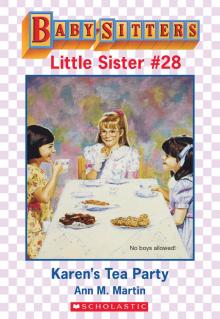 Karen's Tea Party
Karen's Tea Party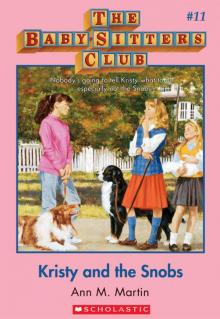 Kristy and the Snobs
Kristy and the Snobs Best Kept Secret
Best Kept Secret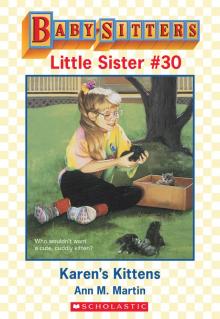 Karen's Kittens
Karen's Kittens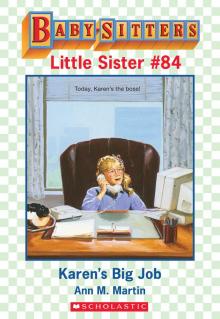 Karen's Big Job
Karen's Big Job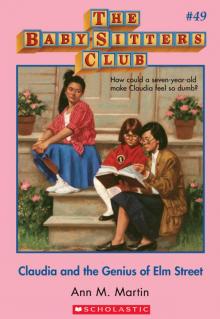 Claudia and the Genius of Elm Street
Claudia and the Genius of Elm Street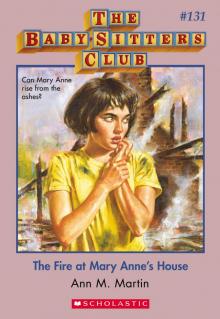 The Fire at Mary Anne's House
The Fire at Mary Anne's House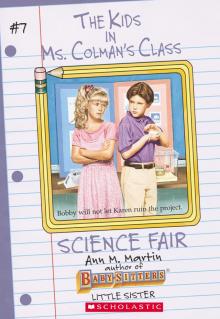 Science Fair
Science Fair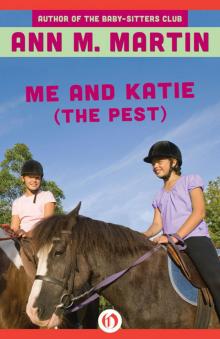 Me and Katie (The Pest)
Me and Katie (The Pest)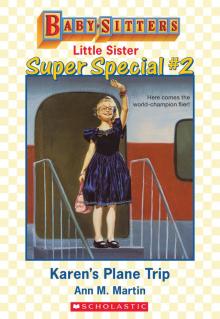 Karen's Plane Trip
Karen's Plane Trip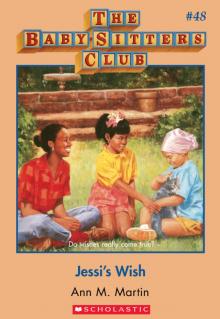 Jessi's Wish
Jessi's Wish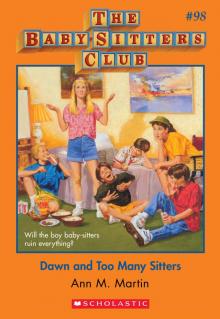 Dawn and Too Many Sitters
Dawn and Too Many Sitters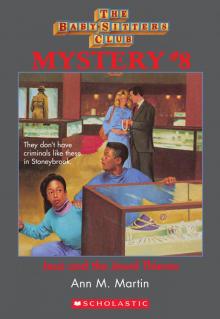 Jessi and the Jewel Thieves
Jessi and the Jewel Thieves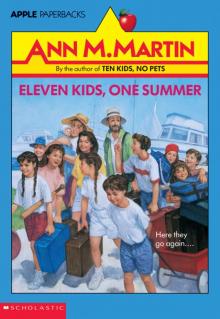 Eleven Kids, One Summer
Eleven Kids, One Summer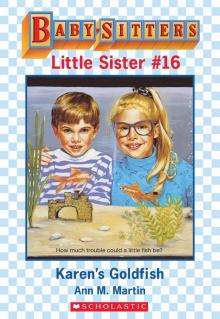 Karen's Goldfish
Karen's Goldfish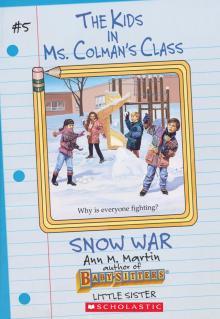 Snow War
Snow War Abby and the Secret Society
Abby and the Secret Society Keeping Secrets
Keeping Secrets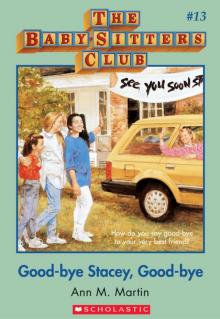 Good-Bye Stacey, Good-Bye
Good-Bye Stacey, Good-Bye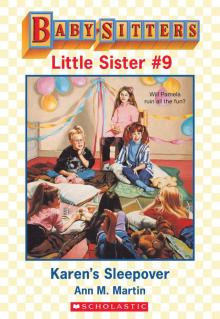 Karen's Sleepover
Karen's Sleepover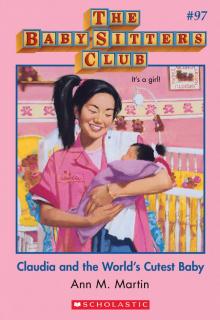 Claudia and the World's Cutest Baby
Claudia and the World's Cutest Baby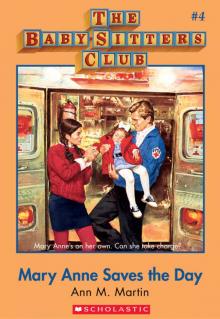 Mary Anne Saves the Day
Mary Anne Saves the Day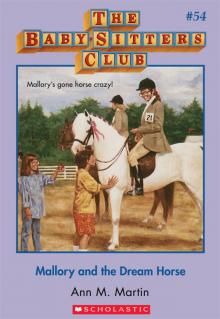 Mallory and the Dream Horse
Mallory and the Dream Horse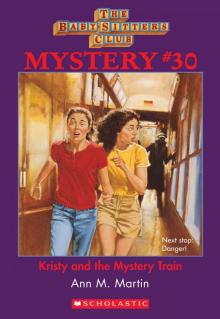 Kristy and the Mystery Train
Kristy and the Mystery Train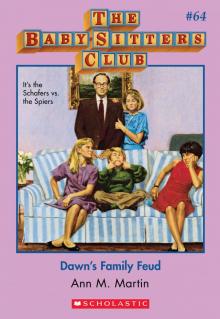 Dawn's Family Feud
Dawn's Family Feud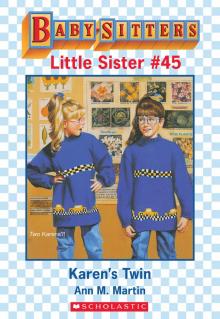 Karen's Twin
Karen's Twin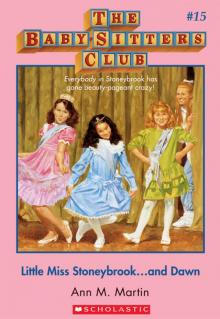 Little Miss Stoneybrook... And Dawn
Little Miss Stoneybrook... And Dawn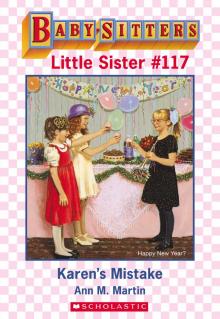 Karen's Mistake
Karen's Mistake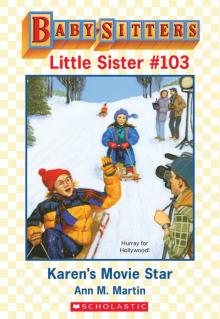 Karen's Movie Star
Karen's Movie Star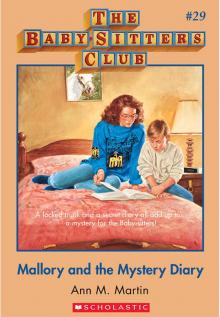 Mallory and the Mystery Diary
Mallory and the Mystery Diary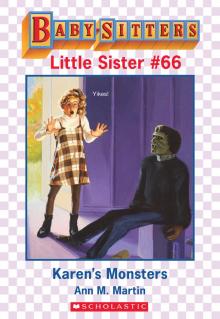 Karen's Monsters
Karen's Monsters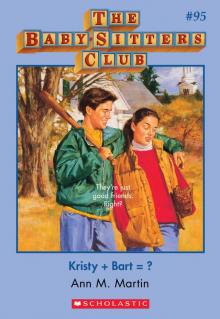 Kristy + Bart = ?
Kristy + Bart = ?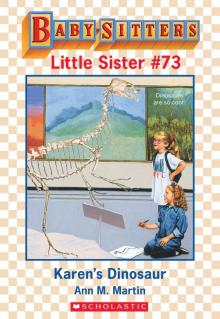 Karen's Dinosaur
Karen's Dinosaur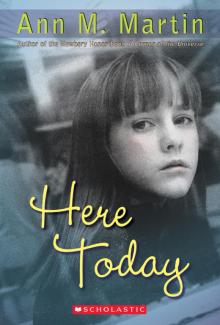 Here Today
Here Today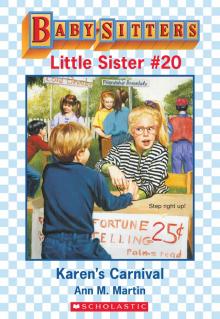 Karen's Carnival
Karen's Carnival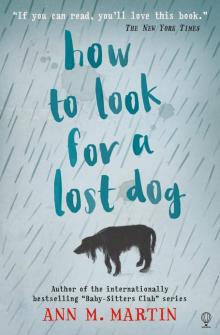 How to Look for a Lost Dog
How to Look for a Lost Dog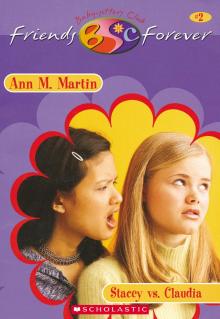 Stacey vs. Claudia
Stacey vs. Claudia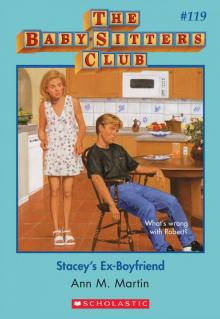 Stacey's Ex-Boyfriend
Stacey's Ex-Boyfriend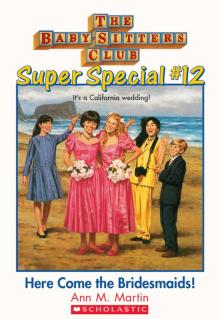 Here Come the Bridesmaids!
Here Come the Bridesmaids! Graduation Day
Graduation Day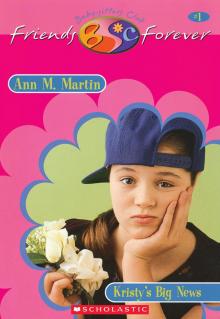 Kristy's Big News
Kristy's Big News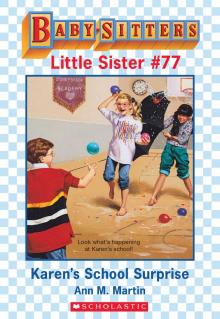 Karen's School Surprise
Karen's School Surprise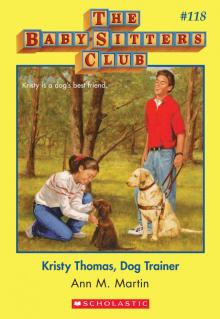 Kristy Thomas, Dog Trainer
Kristy Thomas, Dog Trainer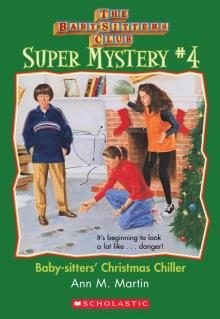 Baby-Sitters' Christmas Chiller
Baby-Sitters' Christmas Chiller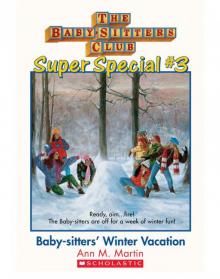 Baby-Sitters' Winter Vacation
Baby-Sitters' Winter Vacation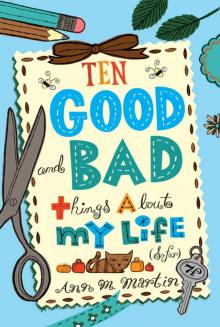 Ten Good and Bad Things About My Life
Ten Good and Bad Things About My Life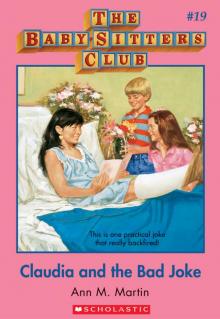 Claudia and the Bad Joke
Claudia and the Bad Joke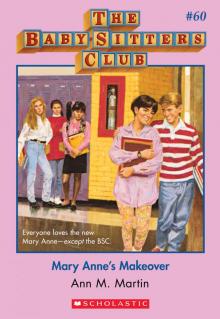 Mary Anne's Makeover
Mary Anne's Makeover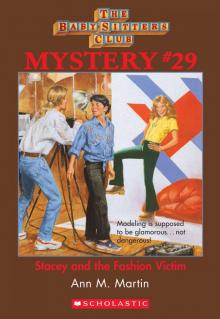 Stacey and the Fashion Victim
Stacey and the Fashion Victim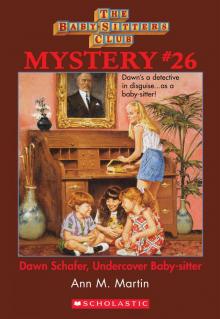 Dawn Schafer, Undercover Baby-Sitter
Dawn Schafer, Undercover Baby-Sitter Karen's Tuba
Karen's Tuba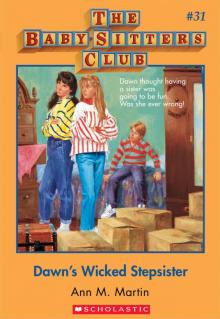 Dawn's Wicked Stepsister
Dawn's Wicked Stepsister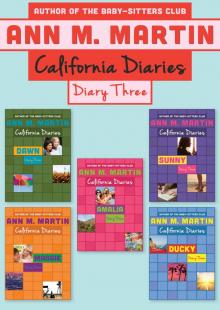 Diary Three: Dawn, Sunny, Maggie, Amalia, and Ducky
Diary Three: Dawn, Sunny, Maggie, Amalia, and Ducky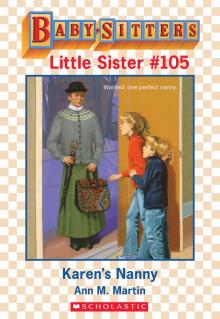 Karen's Nanny
Karen's Nanny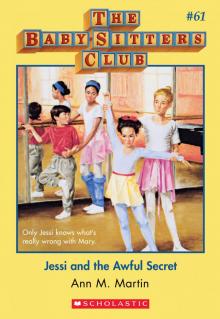 Jessi and the Awful Secret
Jessi and the Awful Secret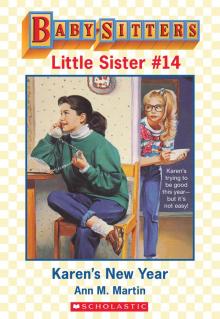 Karen's New Year
Karen's New Year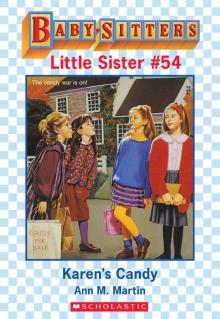 Karen's Candy
Karen's Candy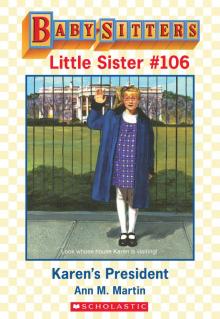 Karen's President
Karen's President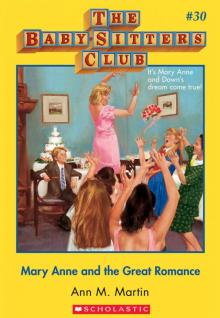 Mary Anne and the Great Romance
Mary Anne and the Great Romance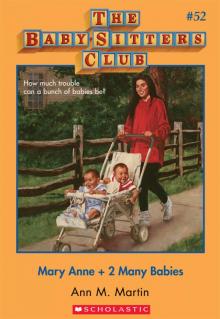 Mary Anne + 2 Many Babies
Mary Anne + 2 Many Babies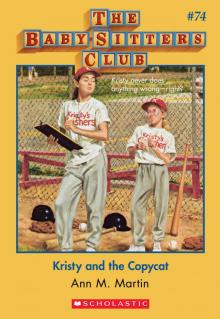 Kristy and the Copycat
Kristy and the Copycat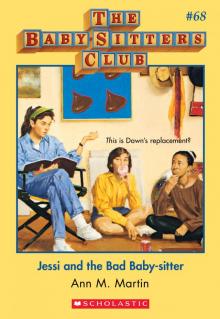 Jessi and the Bad Baby-Sitter
Jessi and the Bad Baby-Sitter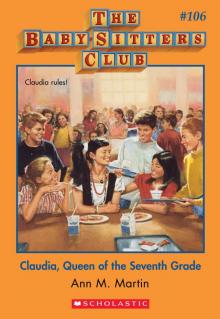 Claudia, Queen of the Seventh Grade
Claudia, Queen of the Seventh Grade Claudia and the Lighthouse Ghost
Claudia and the Lighthouse Ghost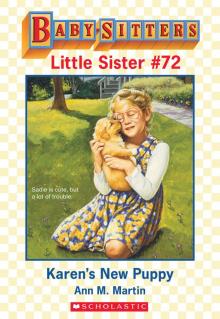 Karen's New Puppy
Karen's New Puppy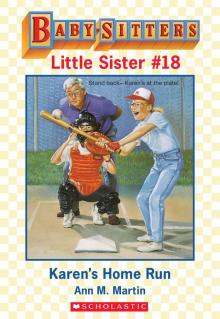 Karen's Home Run
Karen's Home Run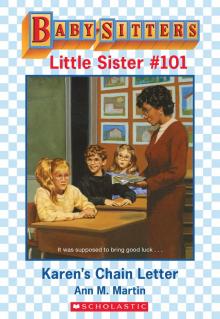 Karen's Chain Letter
Karen's Chain Letter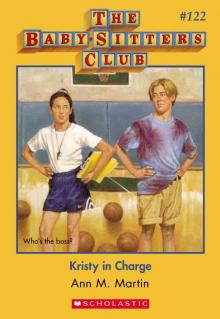 Kristy in Charge
Kristy in Charge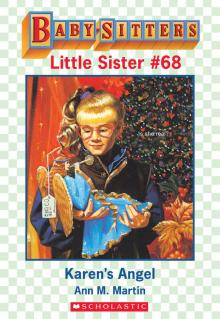 Karen's Angel
Karen's Angel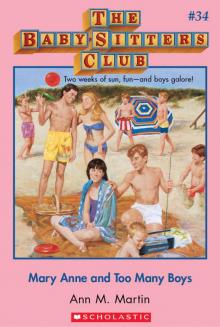 Mary Anne and Too Many Boys
Mary Anne and Too Many Boys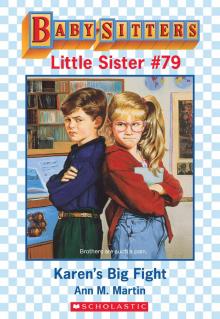 Karen's Big Fight
Karen's Big Fight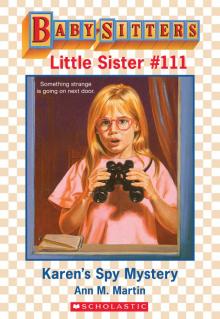 Karen's Spy Mystery
Karen's Spy Mystery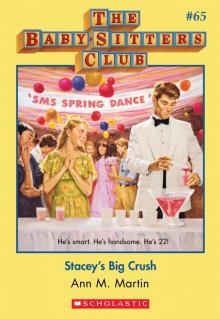 Stacey's Big Crush
Stacey's Big Crush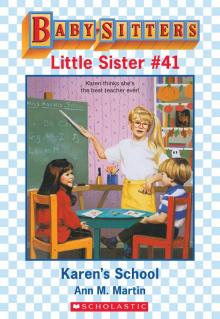 Karen's School
Karen's School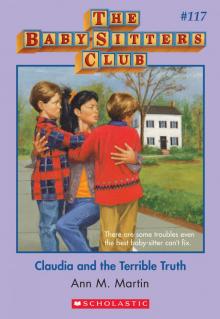 Claudia and the Terrible Truth
Claudia and the Terrible Truth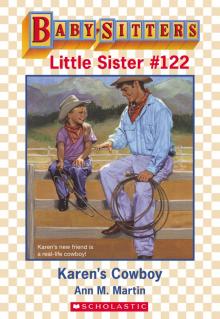 Karen's Cowboy
Karen's Cowboy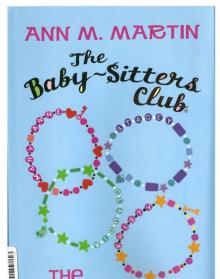 The Summer Before
The Summer Before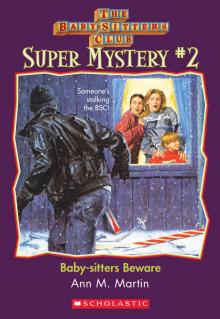 Beware, Dawn!
Beware, Dawn!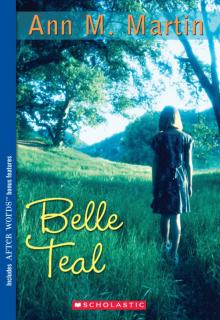 Belle Teale
Belle Teale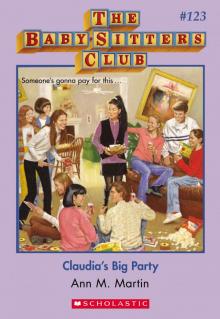 Claudia's Big Party
Claudia's Big Party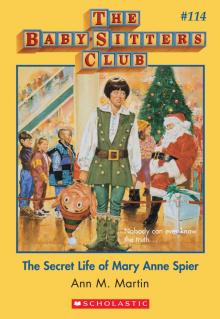 The Secret Life of Mary Anne Spier
The Secret Life of Mary Anne Spier Karen's Book
Karen's Book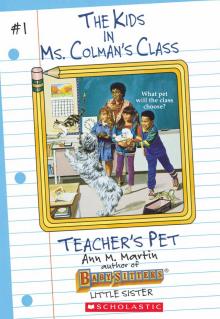 Teacher's Pet
Teacher's Pet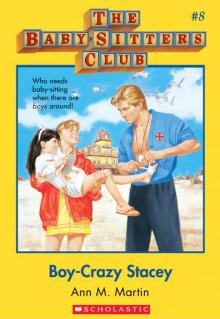 Boy-Crazy Stacey
Boy-Crazy Stacey Claudia and the Disaster Date
Claudia and the Disaster Date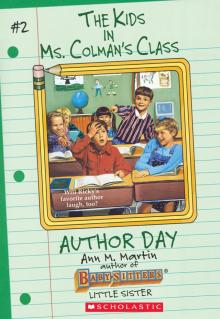 Author Day
Author Day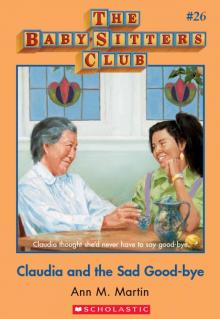 Claudia and the Sad Good-Bye
Claudia and the Sad Good-Bye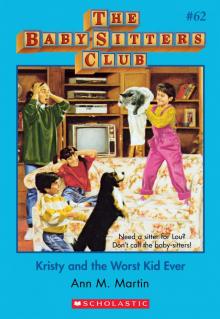 Kristy and the Worst Kid Ever
Kristy and the Worst Kid Ever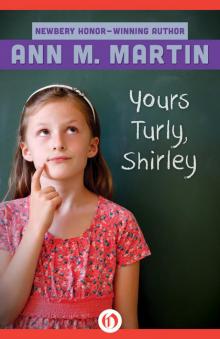 Yours Turly, Shirley
Yours Turly, Shirley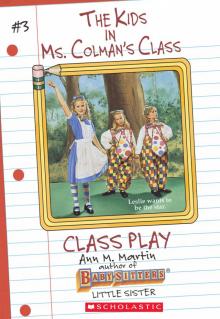 Class Play
Class Play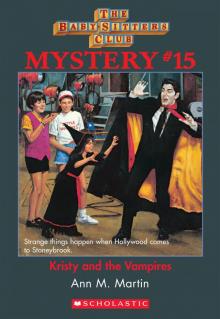 Kristy and the Vampires
Kristy and the Vampires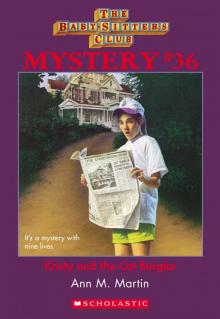 Kristy and the Cat Burglar
Kristy and the Cat Burglar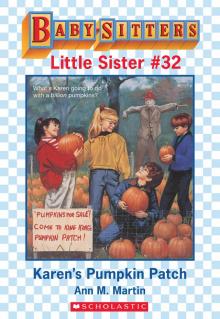 Karen's Pumpkin Patch
Karen's Pumpkin Patch Stacey and the Mystery at the Empty House
Stacey and the Mystery at the Empty House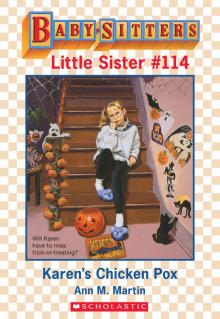 Karen's Chicken Pox
Karen's Chicken Pox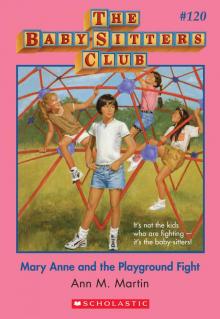 Mary Anne and the Playground Fight
Mary Anne and the Playground Fight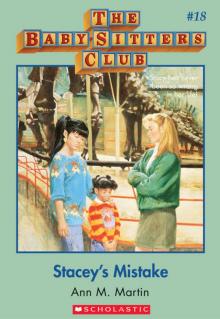 Stacey's Mistake
Stacey's Mistake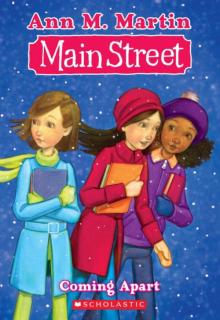 Coming Apart
Coming Apart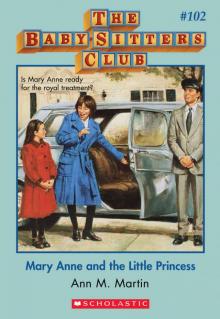 Mary Anne and the Little Princess
Mary Anne and the Little Princess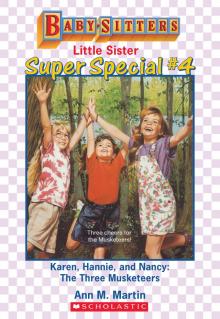 Karen, Hannie and Nancy: The Three Musketeers
Karen, Hannie and Nancy: The Three Musketeers 'Tis the Season
'Tis the Season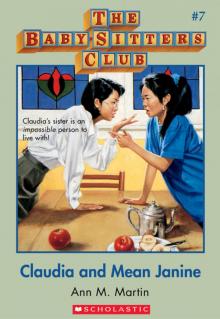 Claudia and Mean Janine
Claudia and Mean Janine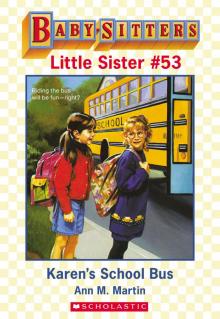 Karen's School Bus
Karen's School Bus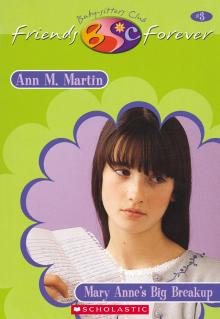 Mary Anne's Big Breakup
Mary Anne's Big Breakup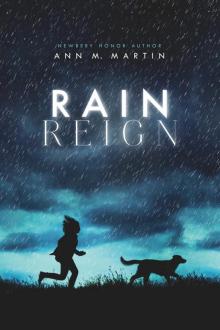 Rain Reign
Rain Reign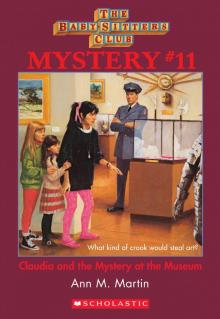 Claudia and the Mystery at the Museum
Claudia and the Mystery at the Museum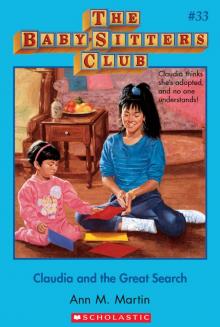 Claudia and the Great Search
Claudia and the Great Search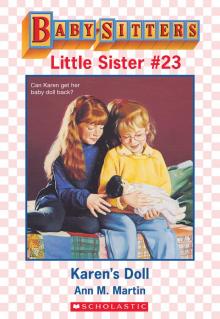 Karen's Doll
Karen's Doll Shannon's Story
Shannon's Story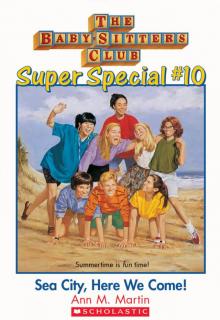 Sea City, Here We Come!
Sea City, Here We Come!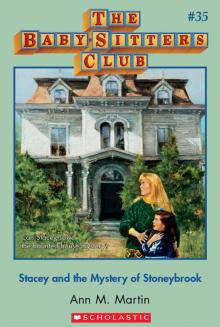 Stacey and the Mystery of Stoneybrook
Stacey and the Mystery of Stoneybrook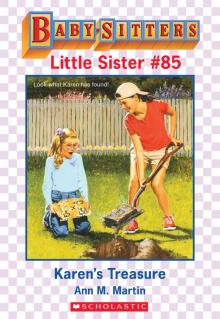 Karen's Treasure
Karen's Treasure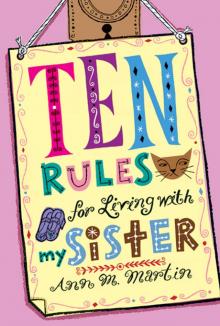 Ten Rules for Living With My Sister
Ten Rules for Living With My Sister With You and Without You
With You and Without You Baby-Sitters' Island Adventure
Baby-Sitters' Island Adventure Karen's Fishing Trip
Karen's Fishing Trip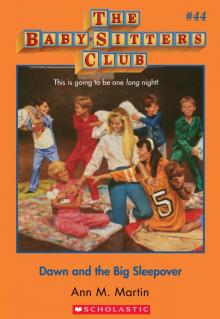 Dawn and the Big Sleepover
Dawn and the Big Sleepover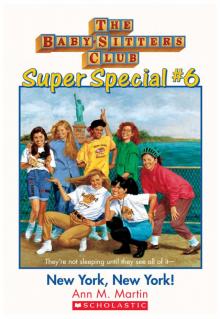 New York, New York!
New York, New York!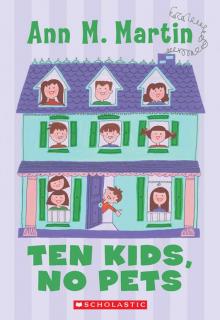 Ten Kids, No Pets
Ten Kids, No Pets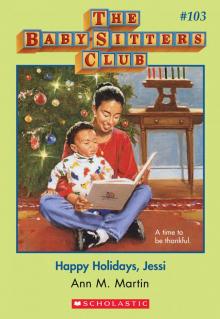 Happy Holidays, Jessi
Happy Holidays, Jessi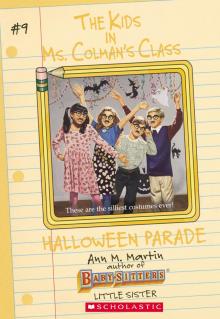 Halloween Parade
Halloween Parade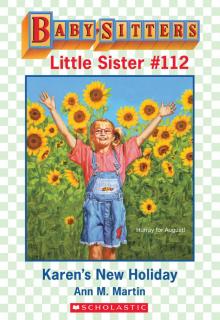 Karen's New Holiday
Karen's New Holiday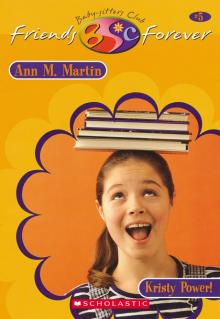 Kristy Power!
Kristy Power!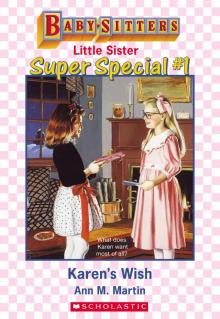 Karen's Wish
Karen's Wish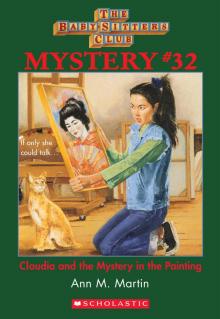 Claudia and the Mystery in the Painting
Claudia and the Mystery in the Painting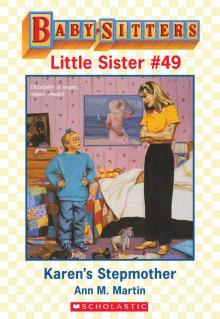 Karen's Stepmother
Karen's Stepmother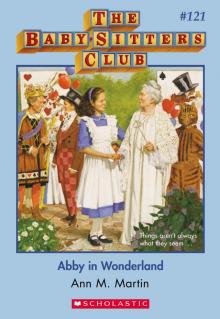 Abby in Wonderland
Abby in Wonderland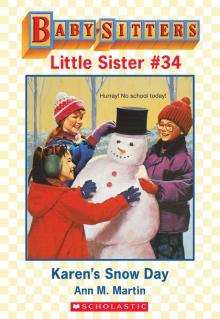 Karen's Snow Day
Karen's Snow Day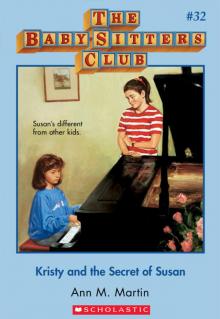 Kristy and the Secret of Susan
Kristy and the Secret of Susan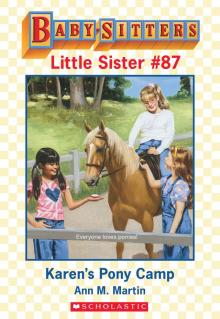 Karen's Pony Camp
Karen's Pony Camp Karen's School Trip
Karen's School Trip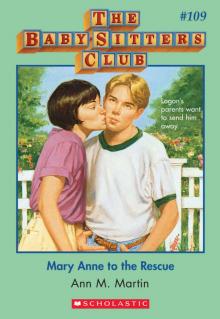 Mary Anne to the Rescue
Mary Anne to the Rescue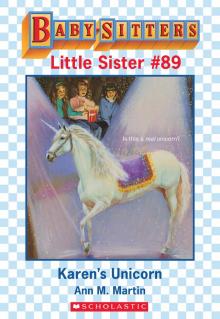 Karen's Unicorn
Karen's Unicorn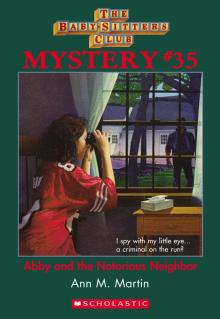 Abby and the Notorious Neighbor
Abby and the Notorious Neighbor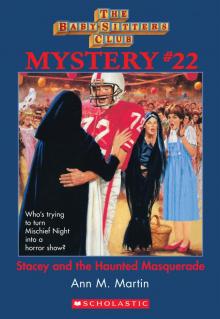 Stacey and the Haunted Masquerade
Stacey and the Haunted Masquerade Claudia Gets Her Guy
Claudia Gets Her Guy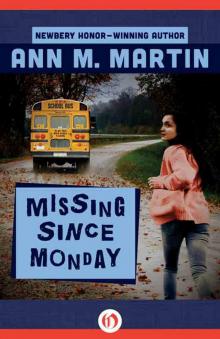 Missing Since Monday
Missing Since Monday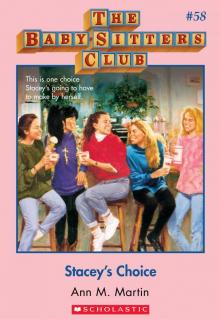 Stacey's Choice
Stacey's Choice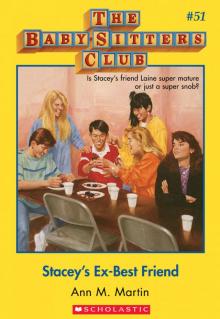 Stacey's Ex-Best Friend
Stacey's Ex-Best Friend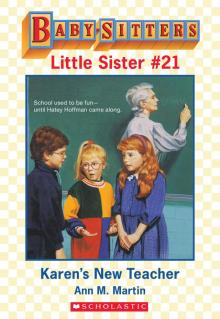 Karen's New Teacher
Karen's New Teacher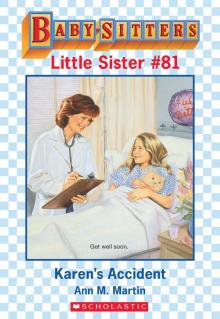 Karen's Accident
Karen's Accident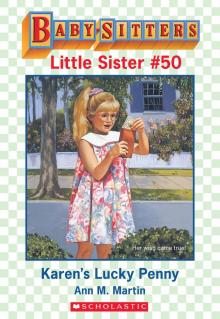 Karen's Lucky Penny
Karen's Lucky Penny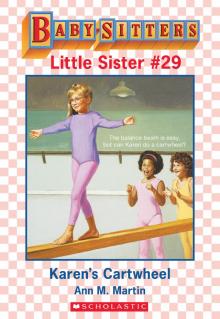 Karen's Cartwheel
Karen's Cartwheel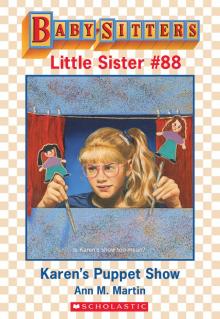 Karen's Puppet Show
Karen's Puppet Show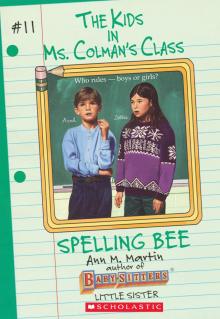 Spelling Bee
Spelling Bee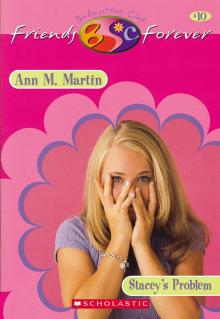 Stacey's Problem
Stacey's Problem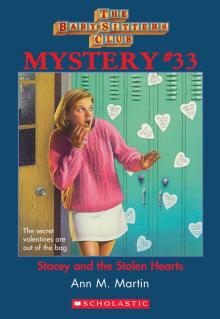 Stacey and the Stolen Hearts
Stacey and the Stolen Hearts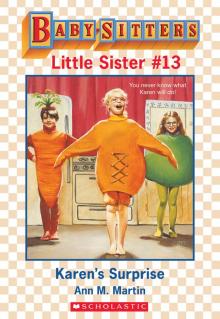 Karen's Surprise
Karen's Surprise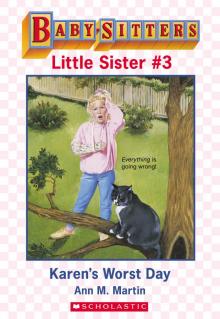 Karen's Worst Day
Karen's Worst Day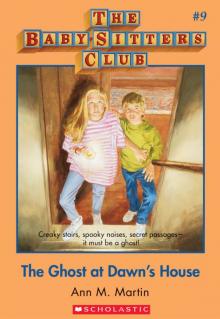 The Ghost at Dawn's House
The Ghost at Dawn's House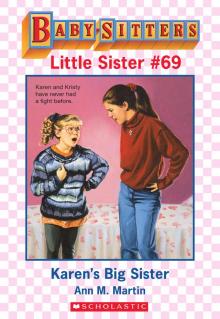 Karen's Big Sister
Karen's Big Sister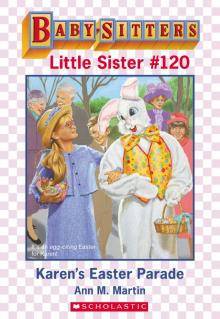 Karen's Easter Parade
Karen's Easter Parade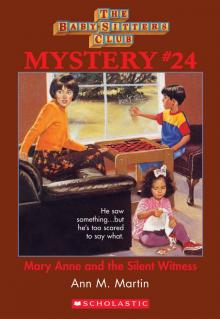 Mary Anne and the Silent Witness
Mary Anne and the Silent Witness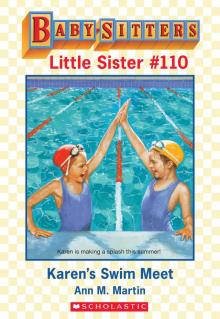 Karen's Swim Meet
Karen's Swim Meet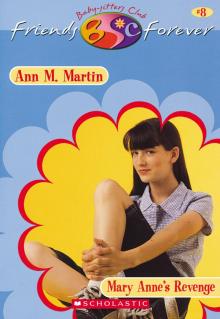 Mary Anne's Revenge
Mary Anne's Revenge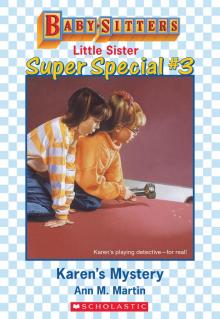 Karen's Mystery
Karen's Mystery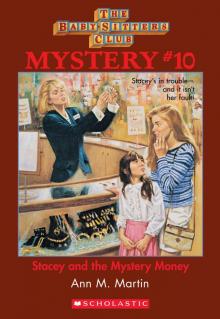 Stacey and the Mystery Money
Stacey and the Mystery Money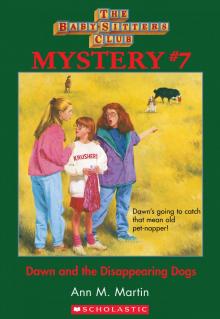 Dawn and the Disappearing Dogs
Dawn and the Disappearing Dogs Karen's Christmas Tree
Karen's Christmas Tree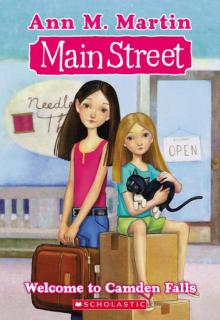 Welcome to Camden Falls
Welcome to Camden Falls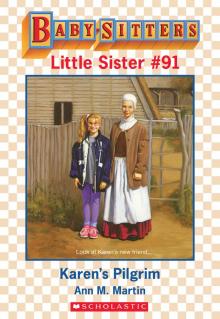 Karen's Pilgrim
Karen's Pilgrim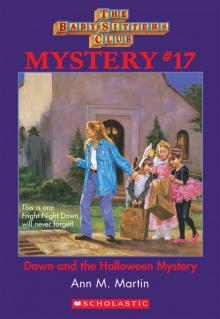 Dawn and the Halloween Mystery
Dawn and the Halloween Mystery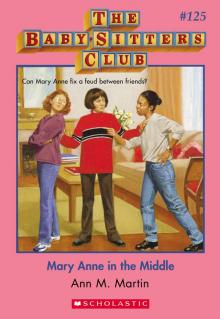 Mary Anne in the Middle
Mary Anne in the Middle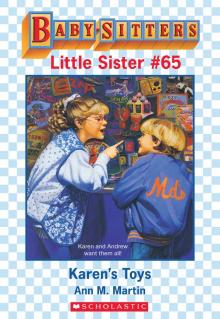 Karen's Toys
Karen's Toys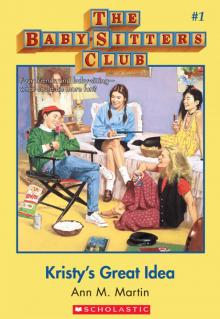 Kristy's Great Idea
Kristy's Great Idea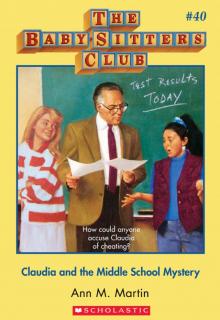 Claudia and the Middle School Mystery
Claudia and the Middle School Mystery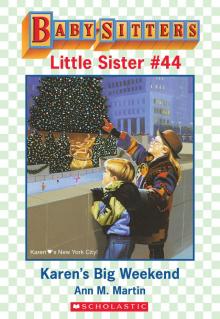 Karen's Big Weekend
Karen's Big Weekend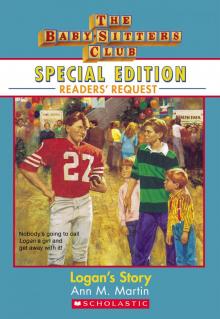 Logan's Story
Logan's Story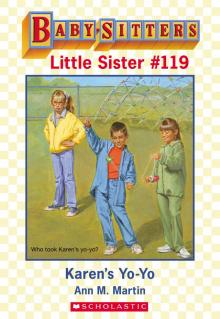 Karen's Yo-Yo
Karen's Yo-Yo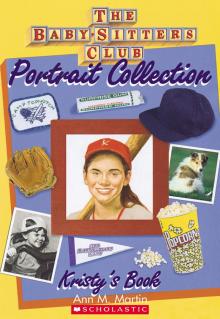 Kristy's Book
Kristy's Book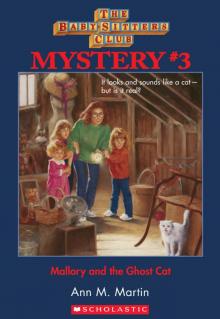 Mallory and the Ghost Cat
Mallory and the Ghost Cat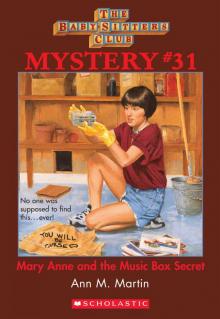 Mary Anne and the Music
Mary Anne and the Music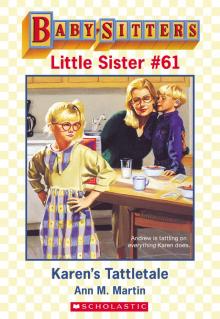 Karen's Tattletale
Karen's Tattletale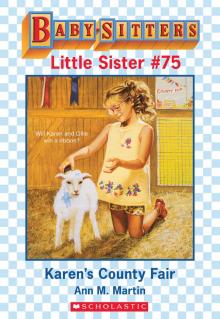 Karen's County Fair
Karen's County Fair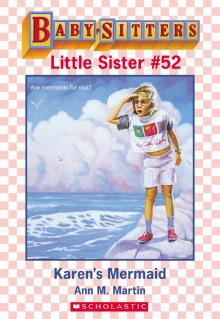 Karen's Mermaid
Karen's Mermaid Snowbound
Snowbound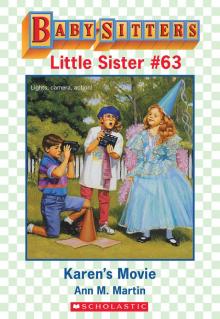 Karen's Movie
Karen's Movie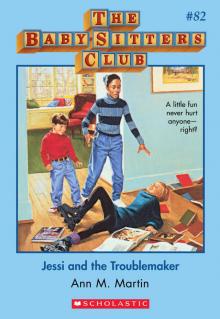 Jessi and the Troublemaker
Jessi and the Troublemaker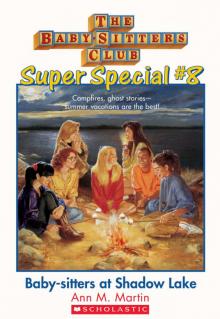 Baby-Sitters at Shadow Lake
Baby-Sitters at Shadow Lake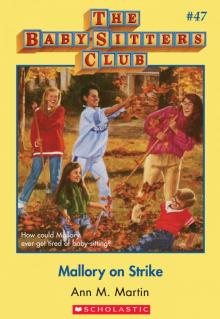 Mallory on Strike
Mallory on Strike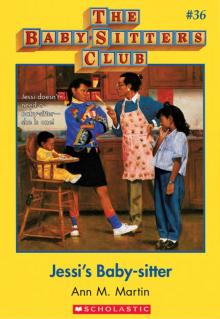 Jessi's Baby-Sitter
Jessi's Baby-Sitter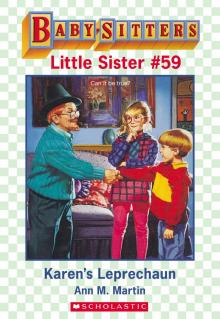 Karen's Leprechaun
Karen's Leprechaun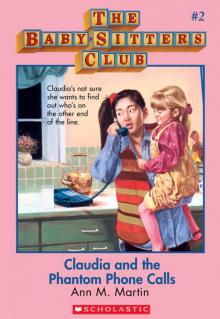 Claudia and the Phantom Phone Calls
Claudia and the Phantom Phone Calls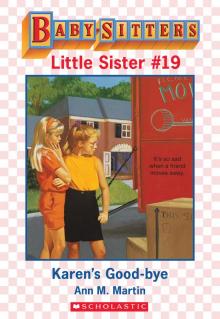 Karen's Good-Bye
Karen's Good-Bye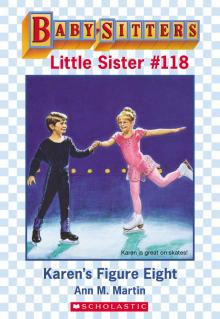 Karen's Figure Eight
Karen's Figure Eight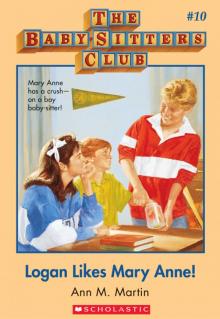 Logan Likes Mary Anne!
Logan Likes Mary Anne!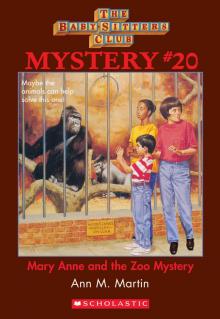 Mary Anne and the Zoo Mystery
Mary Anne and the Zoo Mystery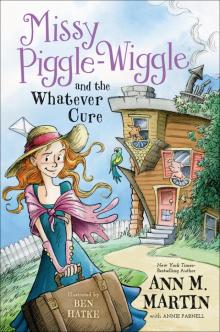 Missy Piggle-Wiggle and the Whatever Cure
Missy Piggle-Wiggle and the Whatever Cure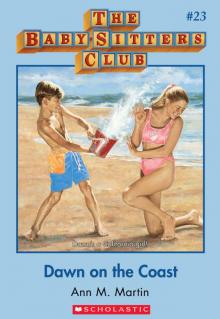 Dawn on the Coast
Dawn on the Coast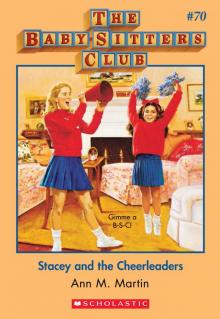 Stacey and the Cheerleaders
Stacey and the Cheerleaders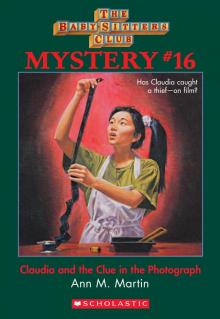 Claudia and the Clue in the Photograph
Claudia and the Clue in the Photograph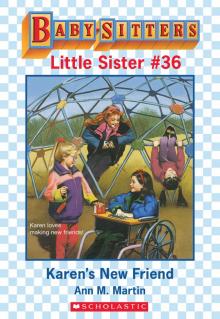 Karen's New Friend
Karen's New Friend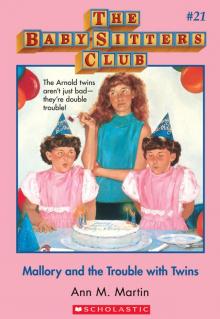 Mallory and the Trouble With Twins
Mallory and the Trouble With Twins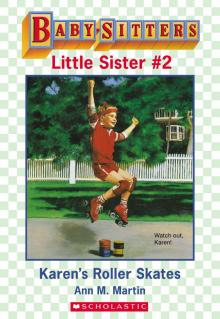 Karen's Roller Skates
Karen's Roller Skates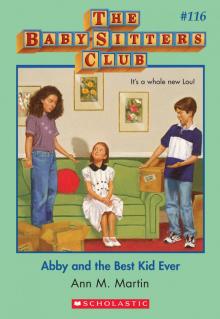 Abby and the Best Kid Ever
Abby and the Best Kid Ever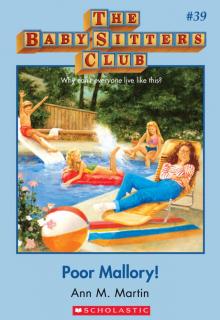 Poor Mallory!
Poor Mallory!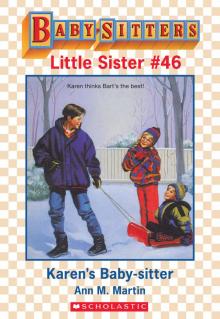 Karen's Witch
Karen's Witch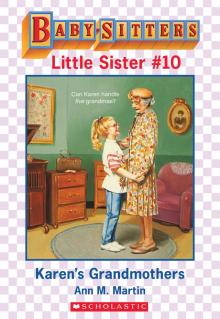 Karen's Grandmothers
Karen's Grandmothers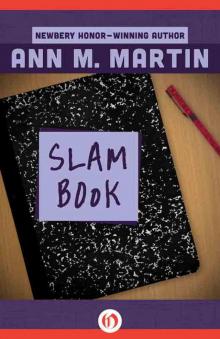 Slam Book
Slam Book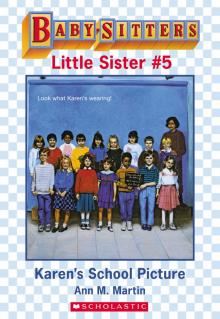 Karen's School Picture
Karen's School Picture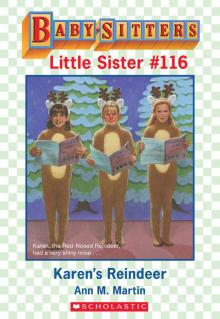 Karen's Reindeer
Karen's Reindeer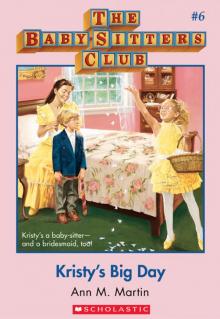 Kristy's Big Day
Kristy's Big Day The Long Way Home
The Long Way Home Karen's Sleigh Ride
Karen's Sleigh Ride On Christmas Eve
On Christmas Eve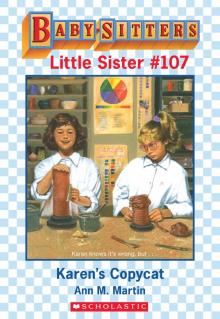 Karen's Copycat
Karen's Copycat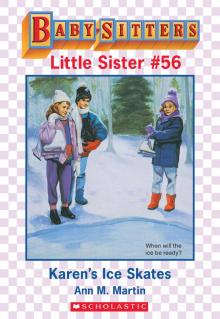 Karen's Ice Skates
Karen's Ice Skates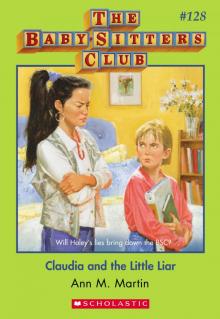 Claudia and the Little Liar
Claudia and the Little Liar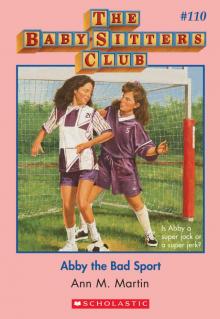 Abby the Bad Sport
Abby the Bad Sport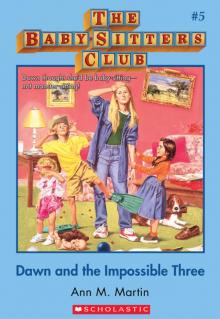 The Baby-Sitters Club #5: Dawn and the Impossible Three
The Baby-Sitters Club #5: Dawn and the Impossible Three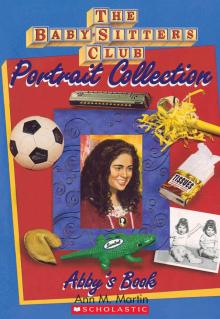 Abby's Book
Abby's Book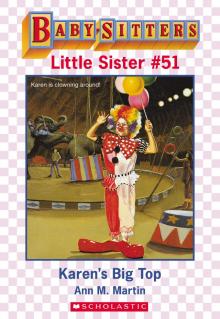 Karen's Big Top
Karen's Big Top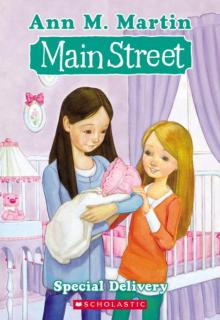 Main Street #8: Special Delivery
Main Street #8: Special Delivery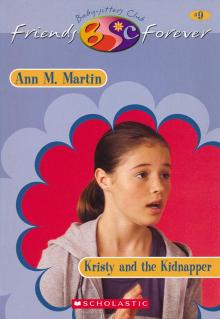 Kristy and the Kidnapper
Kristy and the Kidnapper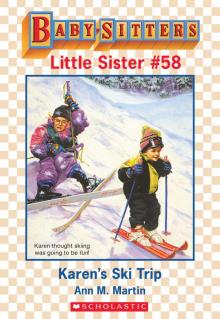 Karen's Ski Trip
Karen's Ski Trip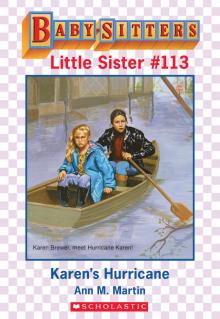 Karen's Hurricane
Karen's Hurricane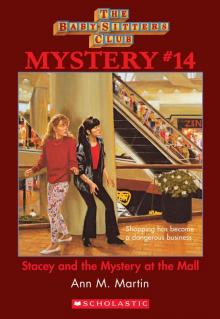 Stacey and the Mystery at the Mall
Stacey and the Mystery at the Mall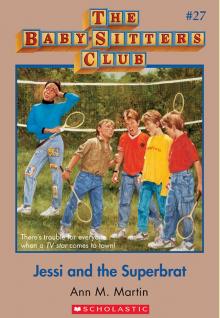 Jessi and the Superbrat
Jessi and the Superbrat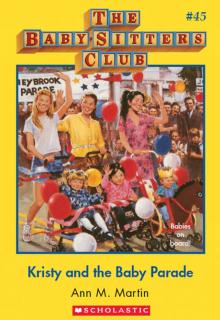 Kristy and the Baby Parade
Kristy and the Baby Parade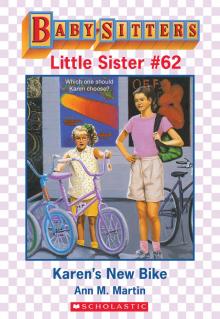 Karen's New Bike
Karen's New Bike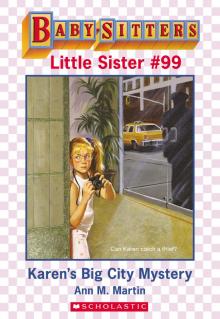 Karen's Big City Mystery
Karen's Big City Mystery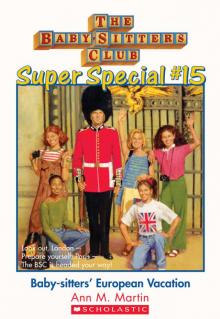 Baby-Sitters' European Vacation
Baby-Sitters' European Vacation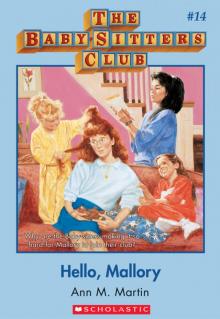 Hello, Mallory
Hello, Mallory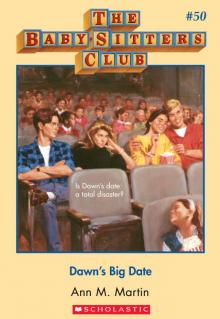 Dawn's Big Date
Dawn's Big Date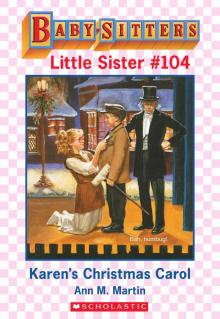 Karen's Christmas Carol
Karen's Christmas Carol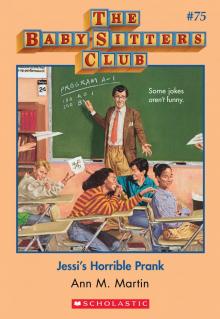 Jessi's Horrible Prank
Jessi's Horrible Prank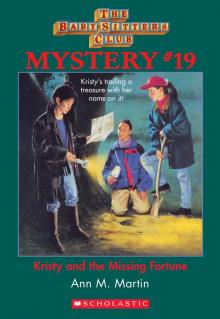 Kristy and the Missing Fortune
Kristy and the Missing Fortune Kristy and the Haunted Mansion
Kristy and the Haunted Mansion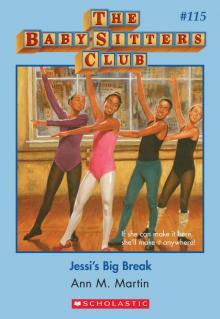 Jessi's Big Break
Jessi's Big Break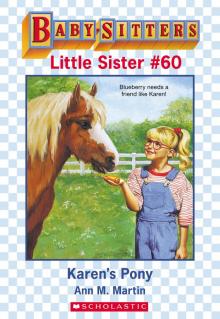 Karen's Pony
Karen's Pony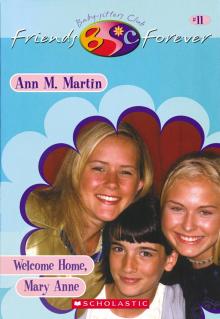 Welcome Home, Mary Anne
Welcome Home, Mary Anne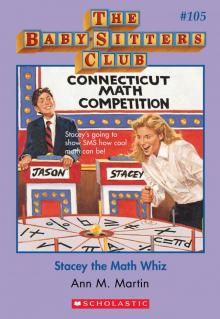 Stacey the Math Whiz
Stacey the Math Whiz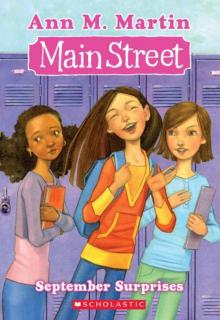 September Surprises
September Surprises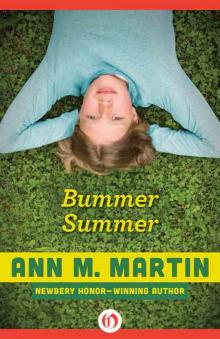 Bummer Summer
Bummer Summer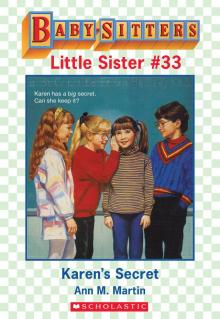 Karen's Secret
Karen's Secret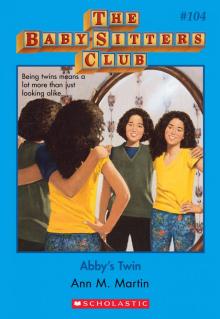 Abby's Twin
Abby's Twin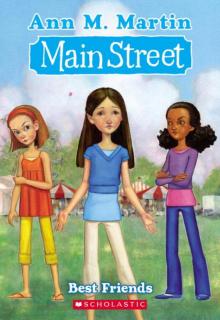 Main Street #4: Best Friends
Main Street #4: Best Friends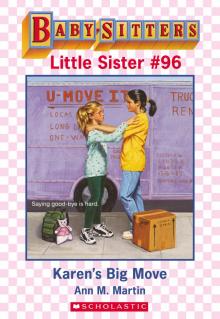 Karen's Big Move
Karen's Big Move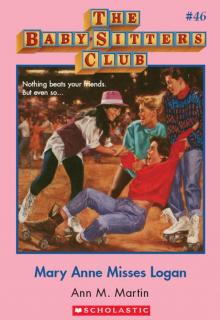 Mary Anne Misses Logan
Mary Anne Misses Logan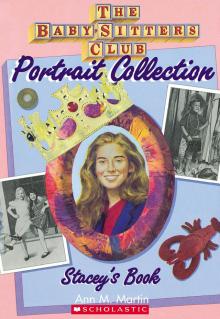 Stacey's Book
Stacey's Book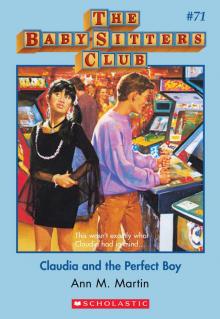 Claudia and the Perfect Boy
Claudia and the Perfect Boy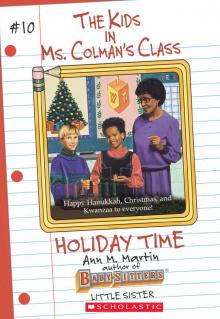 Holiday Time
Holiday Time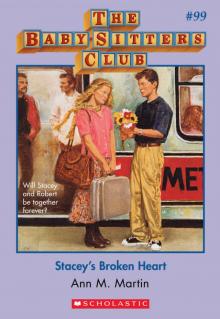 Stacey's Broken Heart
Stacey's Broken Heart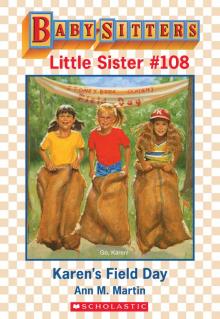 Karen's Field Day
Karen's Field Day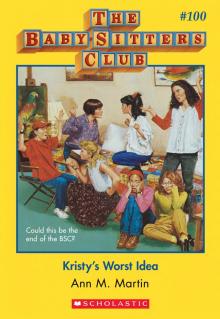 Kristy's Worst Idea
Kristy's Worst Idea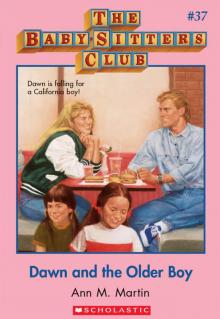 Dawn and the Older Boy
Dawn and the Older Boy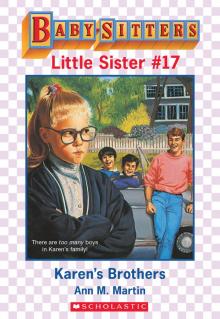 Karen's Brothers
Karen's Brothers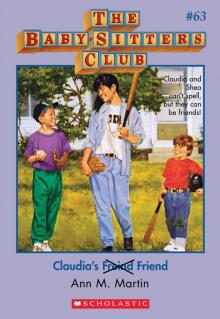 Claudia's Friend
Claudia's Friend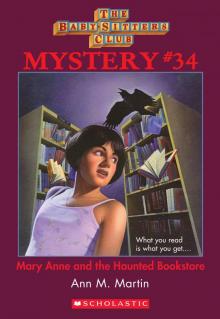 Mary Anne and the Haunted Bookstore
Mary Anne and the Haunted Bookstore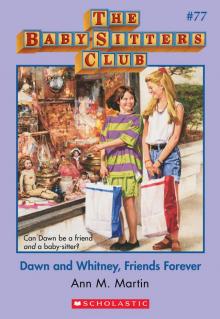 Dawn and Whitney, Friends Forever
Dawn and Whitney, Friends Forever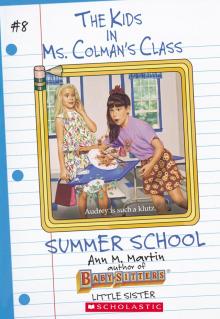 Summer School
Summer School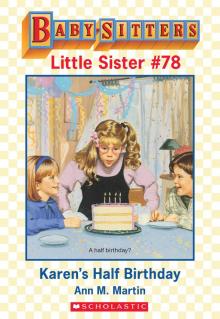 Karen's Birthday
Karen's Birthday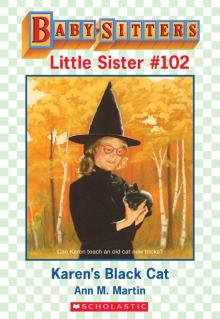 Karen's Black Cat
Karen's Black Cat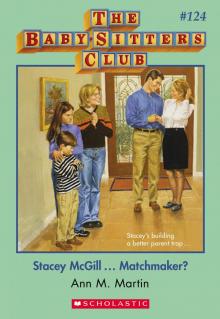 Stacey McGill... Matchmaker?
Stacey McGill... Matchmaker?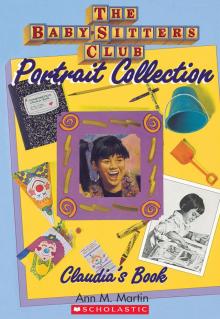 Claudia's Book
Claudia's Book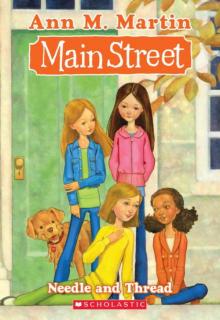 Main Street #2: Needle and Thread
Main Street #2: Needle and Thread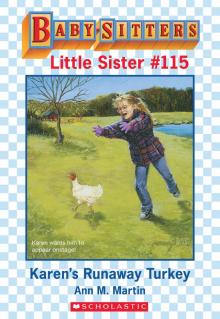 Karen's Runaway Turkey
Karen's Runaway Turkey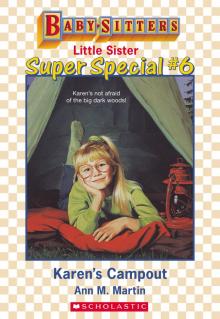 Karen's Campout
Karen's Campout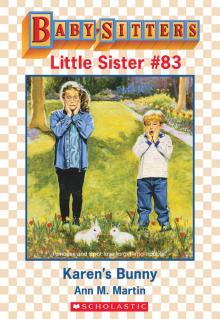 Karen's Bunny
Karen's Bunny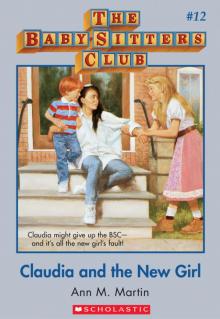 Claudia and the New Girl
Claudia and the New Girl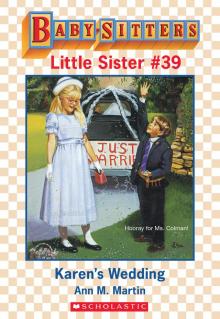 Karen's Wedding
Karen's Wedding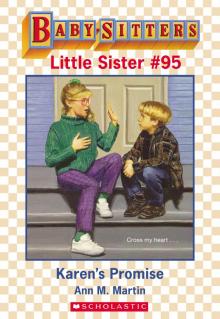 Karen's Promise
Karen's Promise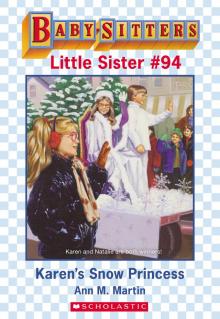 Karen's Snow Princess
Karen's Snow Princess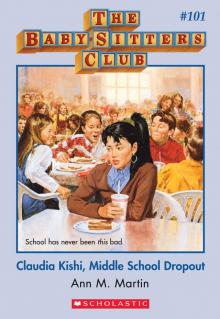 Claudia Kishi, Middle School Dropout
Claudia Kishi, Middle School Dropout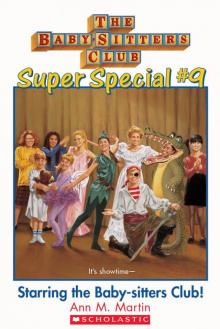 Starring the Baby-Sitters Club!
Starring the Baby-Sitters Club!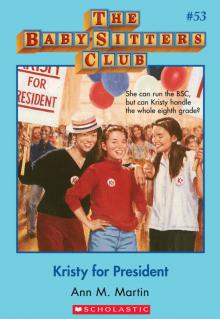 Kristy for President
Kristy for President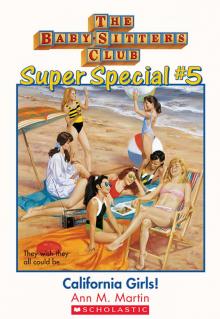 California Girls!
California Girls!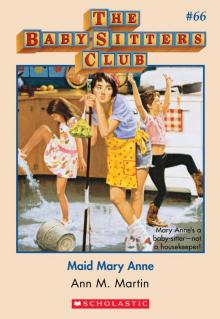 Maid Mary Anne
Maid Mary Anne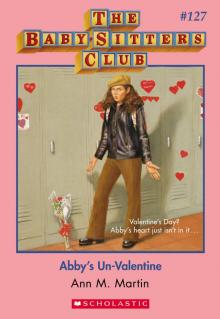 Abby's Un-Valentine
Abby's Un-Valentine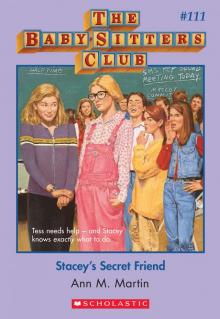 Stacey's Secret Friend
Stacey's Secret Friend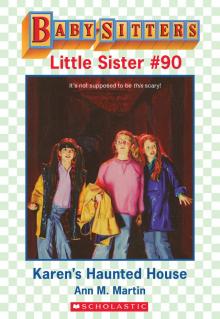 Karen's Haunted House
Karen's Haunted House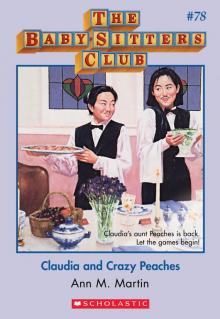 Claudia and Crazy Peaches
Claudia and Crazy Peaches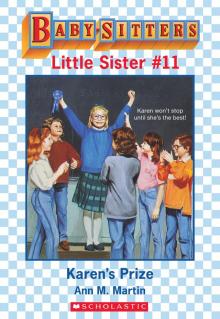 Karen's Prize
Karen's Prize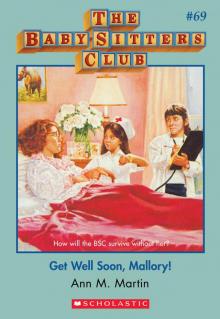 Get Well Soon, Mallory!
Get Well Soon, Mallory!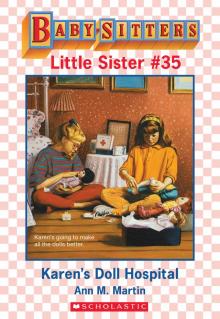 Karen's Doll Hospital
Karen's Doll Hospital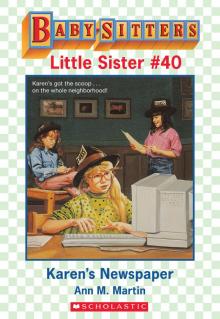 Karen's Newspaper
Karen's Newspaper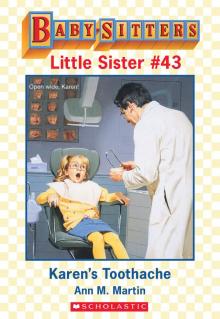 Karen's Toothache
Karen's Toothache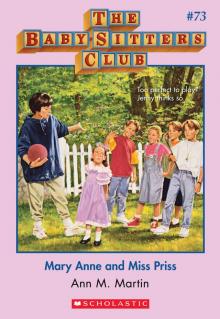 Mary Anne and Miss Priss
Mary Anne and Miss Priss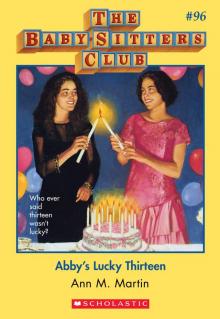 Abby's Lucky Thirteen
Abby's Lucky Thirteen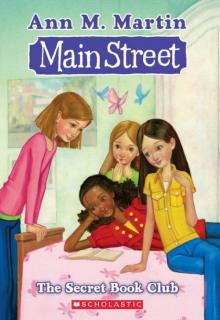 The Secret Book Club
The Secret Book Club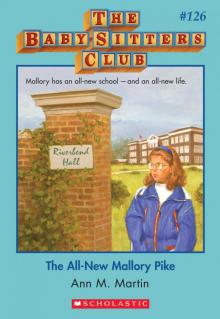 The All-New Mallory Pike
The All-New Mallory Pike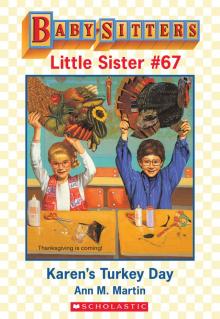 Karen's Turkey Day
Karen's Turkey Day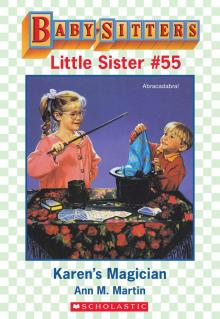 Karen's Magician
Karen's Magician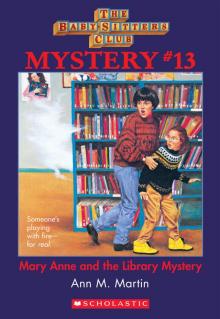 Mary Anne and the Library Mystery
Mary Anne and the Library Mystery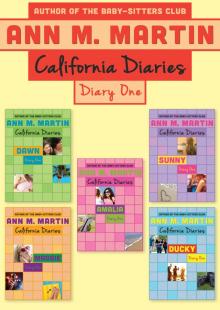 Diary One: Dawn, Sunny, Maggie, Amalia, and Ducky
Diary One: Dawn, Sunny, Maggie, Amalia, and Ducky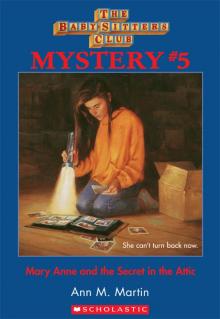 Mary Anne and the Secret in the Attic
Mary Anne and the Secret in the Attic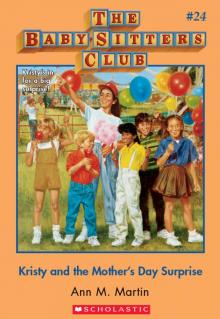 Kristy and the Mother's Day Surprise
Kristy and the Mother's Day Surprise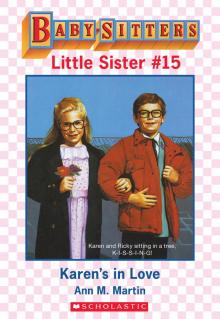 Karen's in Love
Karen's in Love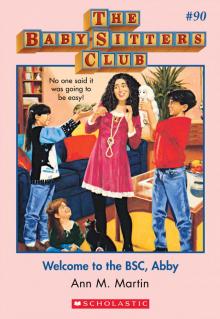 Welcome to the BSC, Abby
Welcome to the BSC, Abby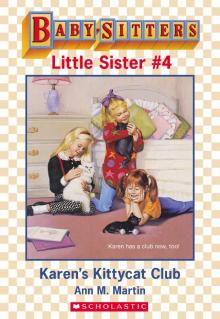 Karen's Kittycat Club
Karen's Kittycat Club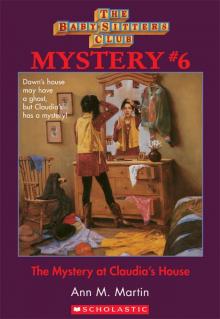 The Mystery at Claudia's House
The Mystery at Claudia's House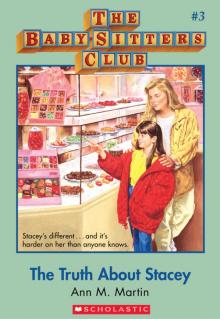 The Truth About Stacey
The Truth About Stacey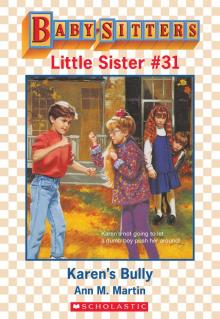 Karen's Bully
Karen's Bully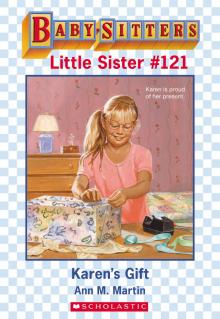 Karen's Gift
Karen's Gift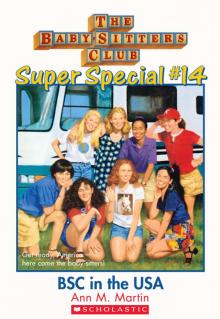 BSC in the USA
BSC in the USA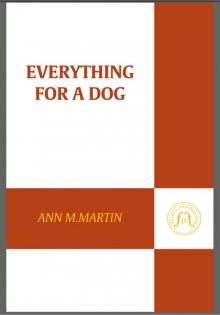 Everything for a Dog
Everything for a Dog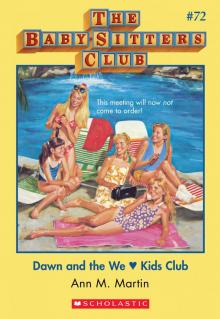 Dawn and the We Love Kids Club
Dawn and the We Love Kids Club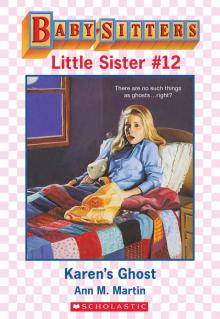 Karen's Ghost
Karen's Ghost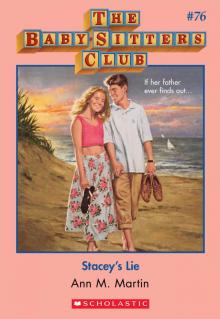 Stacey's Lie
Stacey's Lie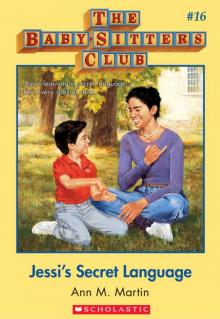 Jessi's Secret Language
Jessi's Secret Language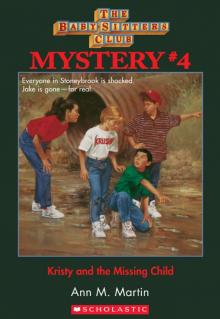 Kristy and the Missing Child
Kristy and the Missing Child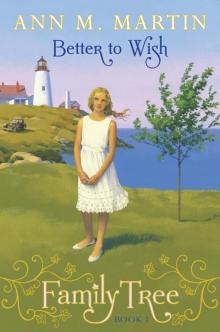 Better to Wish
Better to Wish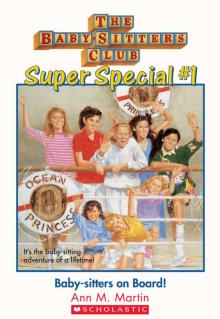 Baby-Sitters on Board!
Baby-Sitters on Board!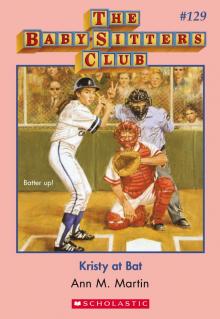 Kristy at Bat
Kristy at Bat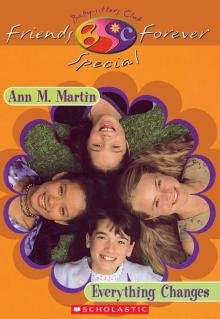 Everything Changes
Everything Changes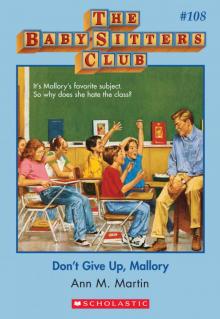 Don't Give Up, Mallory
Don't Give Up, Mallory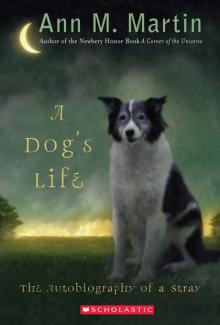 A Dog's Life: The Autobiography of a Stray
A Dog's Life: The Autobiography of a Stray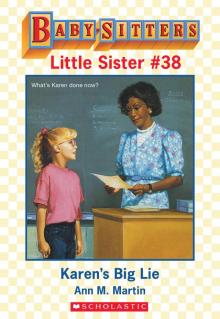 Karen's Big Lie
Karen's Big Lie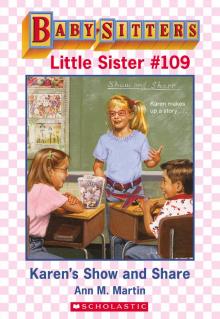 Karen's Show and Share
Karen's Show and Share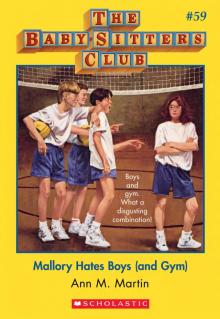 Mallory Hates Boys (and Gym)
Mallory Hates Boys (and Gym)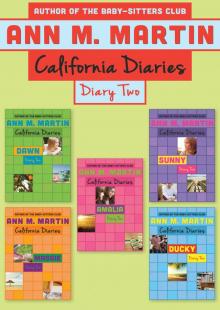 Diary Two: Dawn, Sunny, Maggie, Amalia, and Ducky
Diary Two: Dawn, Sunny, Maggie, Amalia, and Ducky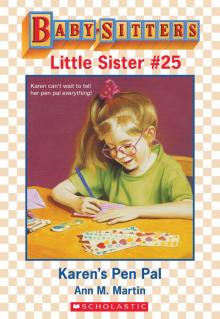 Karen's Pen Pal
Karen's Pen Pal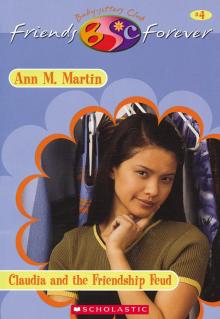 Claudia and the Friendship Feud
Claudia and the Friendship Feud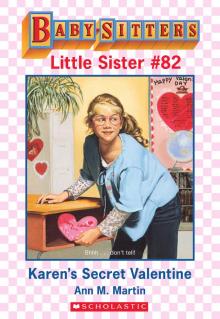 Karen's Secret Valentine
Karen's Secret Valentine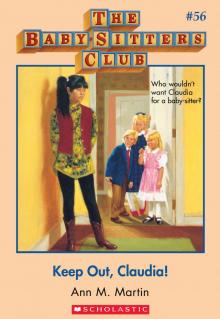 Keep Out, Claudia!
Keep Out, Claudia! Aloha, Baby-Sitters!
Aloha, Baby-Sitters!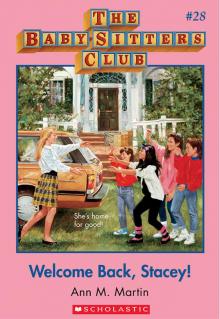 Welcome Back, Stacey
Welcome Back, Stacey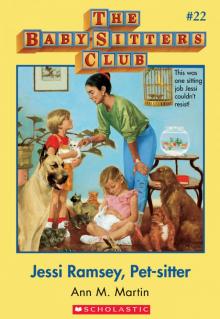 Jessi Ramsey, Pet-Sitter
Jessi Ramsey, Pet-Sitter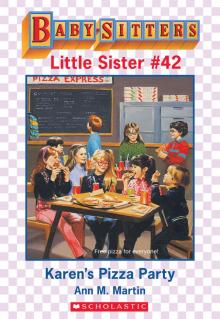 Karen's Pizza Party
Karen's Pizza Party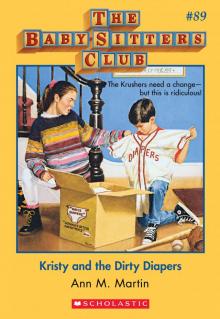 Kristy and the Dirty Diapers
Kristy and the Dirty Diapers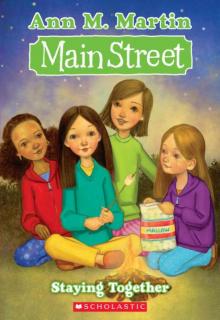 Staying Together
Staying Together Dawn and the Surfer Ghost
Dawn and the Surfer Ghost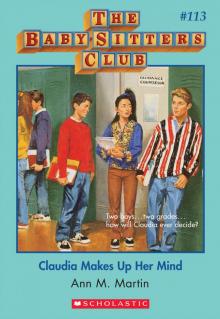 Claudia Makes Up Her Mind
Claudia Makes Up Her Mind Jessi's Gold Medal
Jessi's Gold Medal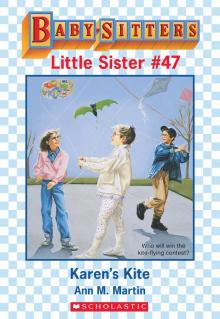 Karen's Kite
Karen's Kite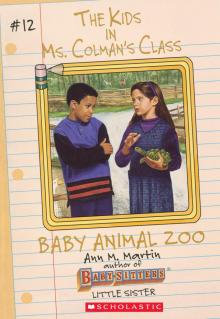 Baby Animal Zoo
Baby Animal Zoo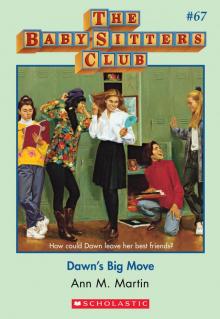 Dawn's Big Move
Dawn's Big Move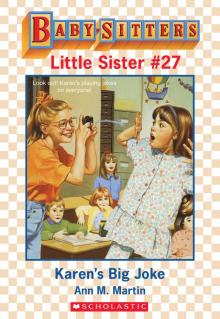 Karen's Big Joke
Karen's Big Joke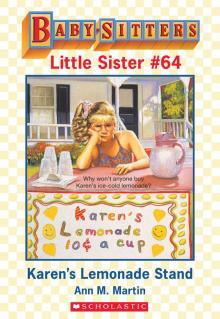 Karen's Lemonade Stand
Karen's Lemonade Stand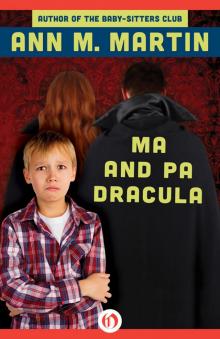 Ma and Pa Dracula
Ma and Pa Dracula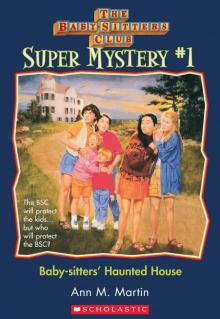 Baby-Sitters' Haunted House
Baby-Sitters' Haunted House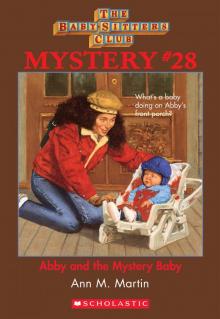 Abby and the Mystery Baby
Abby and the Mystery Baby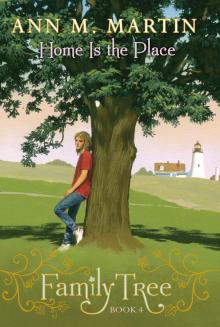 Home Is the Place
Home Is the Place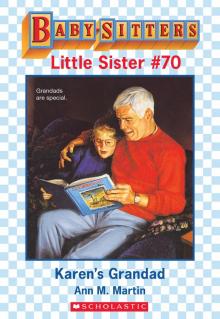 Karen's Grandad
Karen's Grandad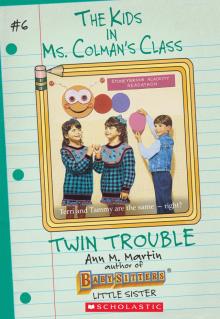 Twin Trouble
Twin Trouble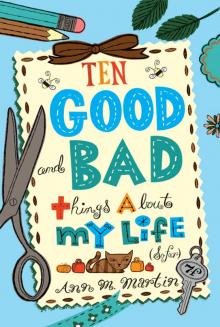 Ten Good and Bad Things About My Life (So Far)
Ten Good and Bad Things About My Life (So Far)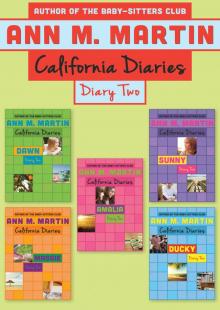 Diary Two
Diary Two Baby-Sitters Club 027
Baby-Sitters Club 027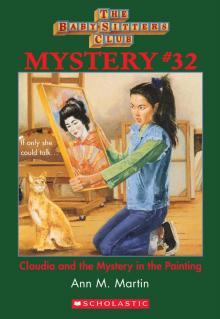 Claudia and the Mystery Painting
Claudia and the Mystery Painting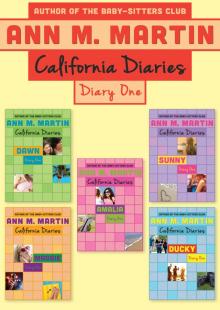 Diary One
Diary One Baby-Sitters Club 037
Baby-Sitters Club 037 Baby-Sitters Club 028
Baby-Sitters Club 028 Baby-Sitters Club 085
Baby-Sitters Club 085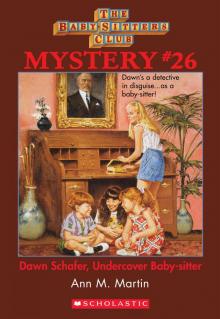 Dawn Schaffer Undercover Baby-Sitter
Dawn Schaffer Undercover Baby-Sitter Jessi's Babysitter
Jessi's Babysitter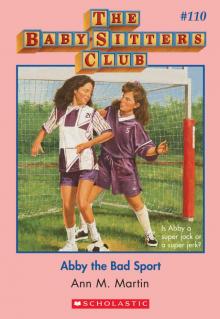 The Baby-Sitters Club #110: Abby the Bad Sport (Baby-Sitters Club, The)
The Baby-Sitters Club #110: Abby the Bad Sport (Baby-Sitters Club, The) Karen's Little Sister
Karen's Little Sister Baby-Sitters Club 058
Baby-Sitters Club 058 Claudia And The Genius On Elm St.
Claudia And The Genius On Elm St.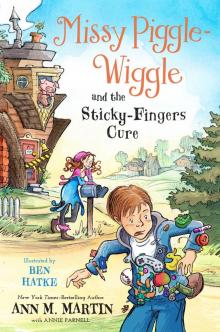 Missy Piggle-Wiggle and the Sticky-Fingers Cure
Missy Piggle-Wiggle and the Sticky-Fingers Cure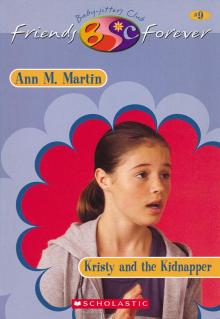 Kristy and Kidnapper
Kristy and Kidnapper Baby-Sitters Club 041
Baby-Sitters Club 041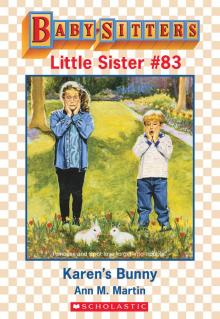 Karen's Bunny Trouble
Karen's Bunny Trouble Baby-Sitters Club 032
Baby-Sitters Club 032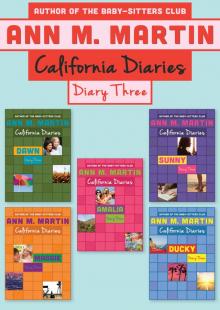 Diary Three
Diary Three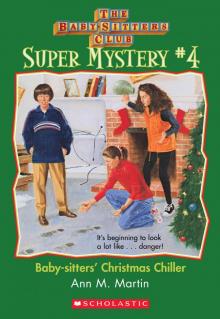 Christmas Chiller
Christmas Chiller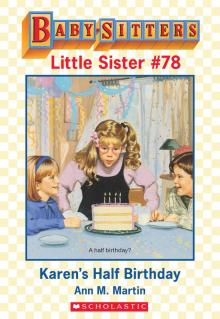 Karen's Half-Birthday
Karen's Half-Birthday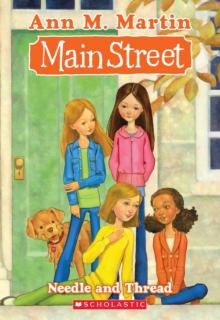 Needle and Thread
Needle and Thread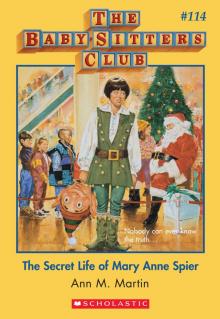 Secret Life of Mary Anne Spier
Secret Life of Mary Anne Spier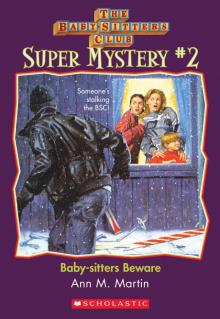 Baby-Sitters Beware
Baby-Sitters Beware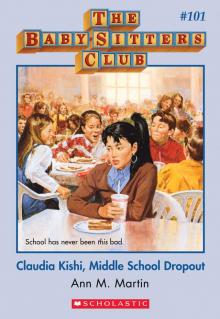 Claudia Kishi, Middle School Drop-Out
Claudia Kishi, Middle School Drop-Out Logan Likes Mary Anne !
Logan Likes Mary Anne ! Baby-Sitters Club 061
Baby-Sitters Club 061 Best Friends
Best Friends Baby-Sitters Club 031
Baby-Sitters Club 031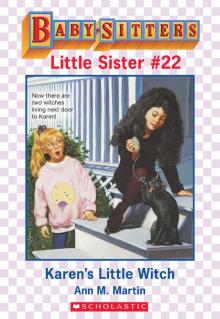 Karen's Little Witch
Karen's Little Witch Jessi Ramsey, Petsitter
Jessi Ramsey, Petsitter Baby-Sitters Club 123
Baby-Sitters Club 123 Baby-Sitters Club 059
Baby-Sitters Club 059 Baby-Sitters Club 033
Baby-Sitters Club 033 Baby-Sitters Club 060
Baby-Sitters Club 060 Baby-Sitters Club 094
Baby-Sitters Club 094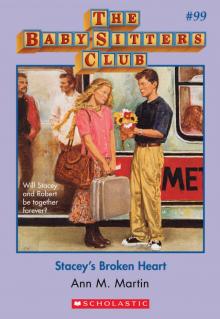 The Baby-Sitters Club #99: Stacey's Broken Heart
The Baby-Sitters Club #99: Stacey's Broken Heart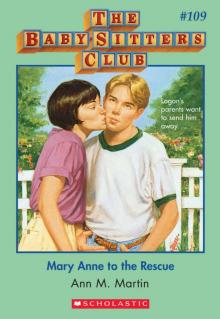 The Baby-Sitters Club #109: Mary Anne to the Rescue (Baby-Sitters Club, The)
The Baby-Sitters Club #109: Mary Anne to the Rescue (Baby-Sitters Club, The) Mystery At Claudia's House
Mystery At Claudia's House Claudia And The Sad Goodbye
Claudia And The Sad Goodbye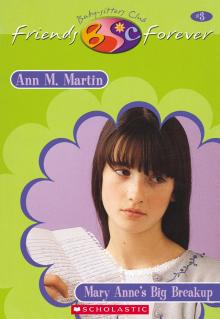 Mary Anne's Big Break-Up
Mary Anne's Big Break-Up Baby-Sitters Club 025
Baby-Sitters Club 025 Baby-Sitters Club 042
Baby-Sitters Club 042 Stacey and the Mystery of the Empty House
Stacey and the Mystery of the Empty House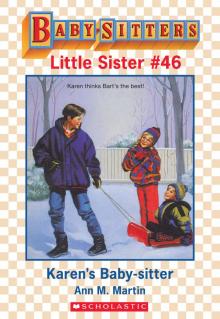 Karen's Baby-Sitter
Karen's Baby-Sitter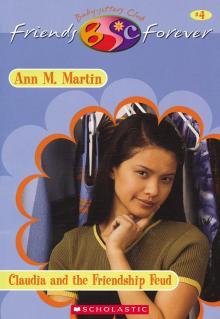 Claudia's Friendship Feud
Claudia's Friendship Feud Baby-Sitters Club 090
Baby-Sitters Club 090 Baby-Sitters Club 021
Baby-Sitters Club 021 Baby-Sitters Club 056
Baby-Sitters Club 056 Baby-Sitters Club 040
Baby-Sitters Club 040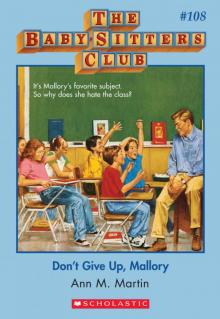 The Baby-Sitters Club #108: Don't Give Up, Mallory (Baby-Sitters Club, The)
The Baby-Sitters Club #108: Don't Give Up, Mallory (Baby-Sitters Club, The)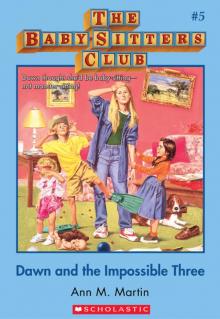 Dawn and the Impossible Three
Dawn and the Impossible Three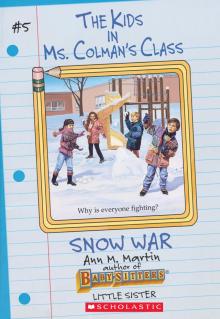 The Snow War
The Snow War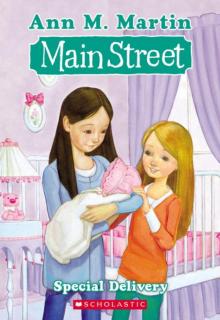 Special Delivery
Special Delivery Baby-Sitters Club 057
Baby-Sitters Club 057 Mary Anne And Too Many Babies
Mary Anne And Too Many Babies Baby-Sitters Club 030
Baby-Sitters Club 030